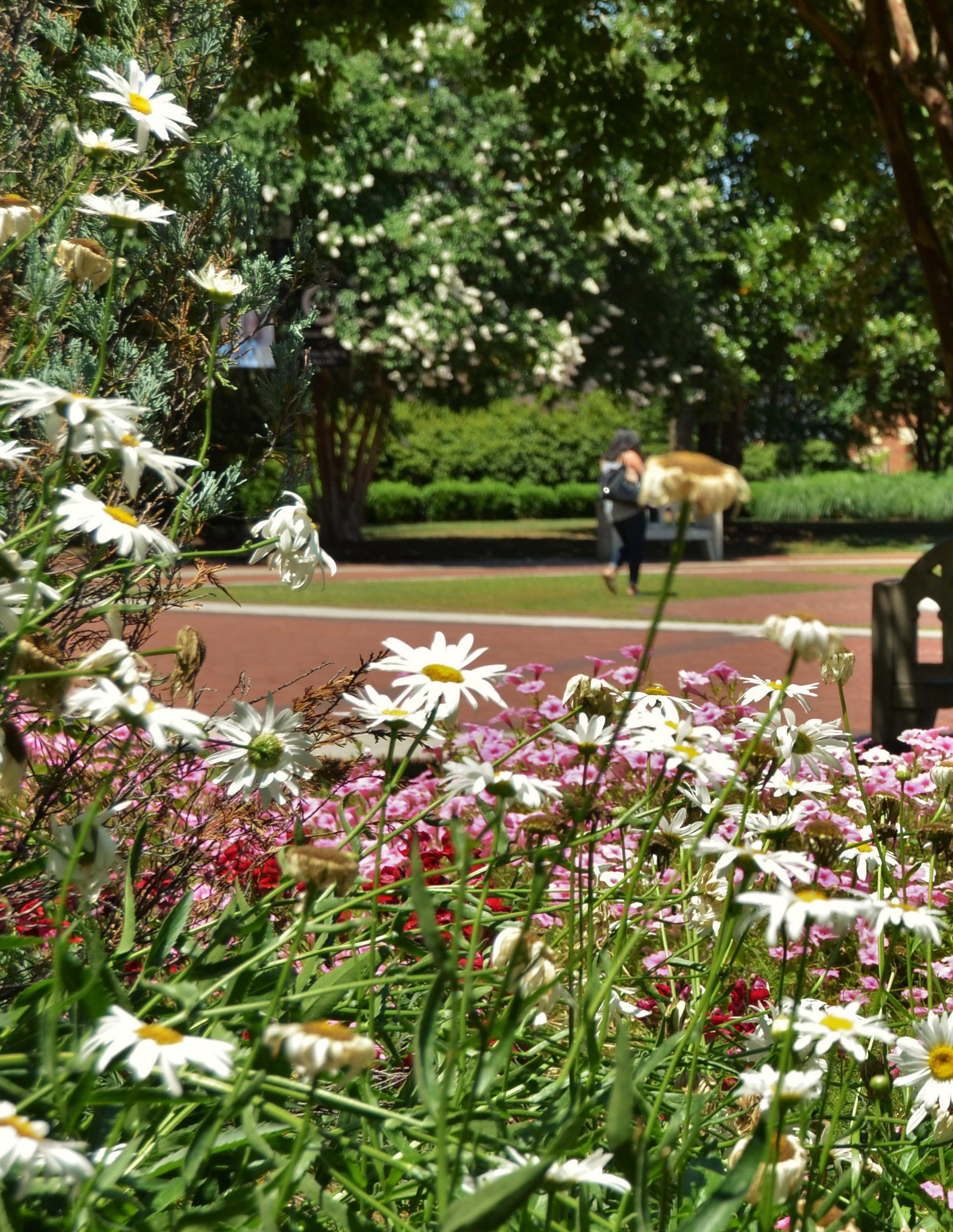HIGHER EDUCATION HIGHER EDUCATION




Greetings,
The pillars of the higher education program at Florida State University are leadership, social justice, and student success. These pillars are embedded in our curriculum, serve as a thread for our faculty’s research agendas, and are key learning outcomes for our students. As the coordinator for our M.S. and Ph.D. programs, I am so proud of the impactful work our faculty and students have contributed to the field in recent years that are rooted in leadership, social justice, and student success. In this Highlights we spotlight our exceptional students, introduce you to our new faculty, and share some of the higher education program’s recent accomplishments.
Over the last year, our faculty has published 42 articles in the field’s most prominent journals, two new books, and 8 new chapters or policy briefs addressing topics related to social justice, leadership education, and policy innovation. Faculty continue to serve as PI or co-PI on grants sponsored by the National Science Foundation (NSF) and Institute of Education Sciences (IES) – worth more than $7 million. Additionally, the Journal of Postsecondary Student Success, the new open-access journal dedicated to improving student achievement, institutional effectiveness and educational policy continues to grow and produce scholarship to advance equity in higher education.
Our students’ efforts have been recognized by leading professional associations in the form of major awards and fellowships. Higher education doctoral candidate, Da’Shay Portis Templeton, has received recognitions as the 2022 National Academies of Sciences, Engineering, and Medicine’s Ford Dissertation Fellowship, the 2022 American Education Research Association’s Research Grant, and the 2022 American Education Research Association’s Minority Dissertation Fellowship. The Florida State University M.S. and Ph.D. students are active across many higher education professional associations with conference presentations, volunteering, and professional development.
There is no doubt that our program’s legacy is driven by the lasting contributions made by our amazing alumni network– affectionately called the “LifeNet.” Among our alumni are tenure-line faculty at major research universities, senior administrators at institutions across the country, policymakers shaping decisions that affect millions of students, and executive leaders at the fields’ most prestigious professional associations. We will introduce you to some of these distinguished alumni in the following pages, but do not be surprised when you run into other members of FSU’s alumni “LifeNet” in key roles throughout postsecondary education. Thank you for your continued support of the higher education program and community.
Dr. Cameron Beatty Coordinator of Florida State University’s Higher Education Program

College Autism Network (CAN) founder Dr. Bradley E. Cox (Associate Professor, Florida State University) and Dr. Brett Ranon Nachman (Assistant Professor, University of Arkansas; Director of Research for CAN) received two grants to launch a national study on autistic college students. Project PEACES (Postsecondary Education: Autistic College Students’ Experiences of Success) explores how autistic students process their college experiences and identify what factors contribute to their definitions of success. Cox and Nachman obtained a national grant from The FAR Fund ($90,000) and a renewable grant of $27,500 from Vanderbilt University’s Frist Center for Autism and Innovation to support this research, intended to gather among the most substantial data on autistic college students in the US. Eligible participants - currently-enrolled autistic undergraduate college students - can complete the survey and earn a $25 gift card. Please visit our website for more information, and to encourage eligible individuals to take the survey.
Dr. Cameron Beatty is set to deliver a keynote speech titled, “Committing to anti-racist practices in leadership education research, teaching, and practice” at the Leadership Educators Institute in December 2022.
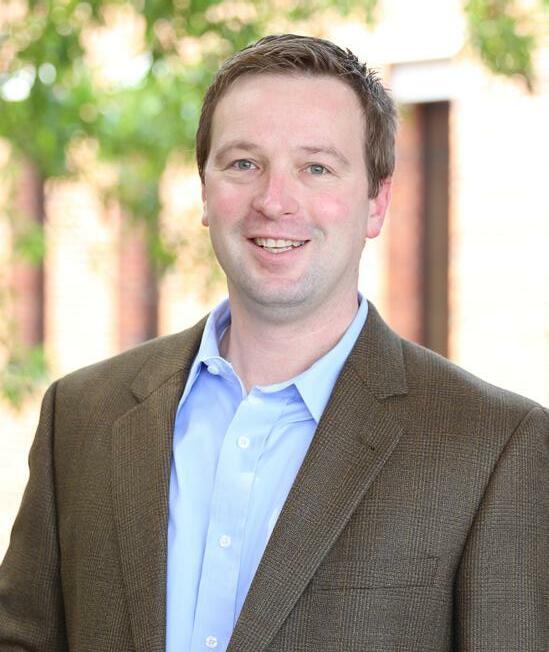

Dr. Kathy Guthrie is on the International Leadership Association Board of Directors, chairing the Committee for the Advancement of Leadership Programs.
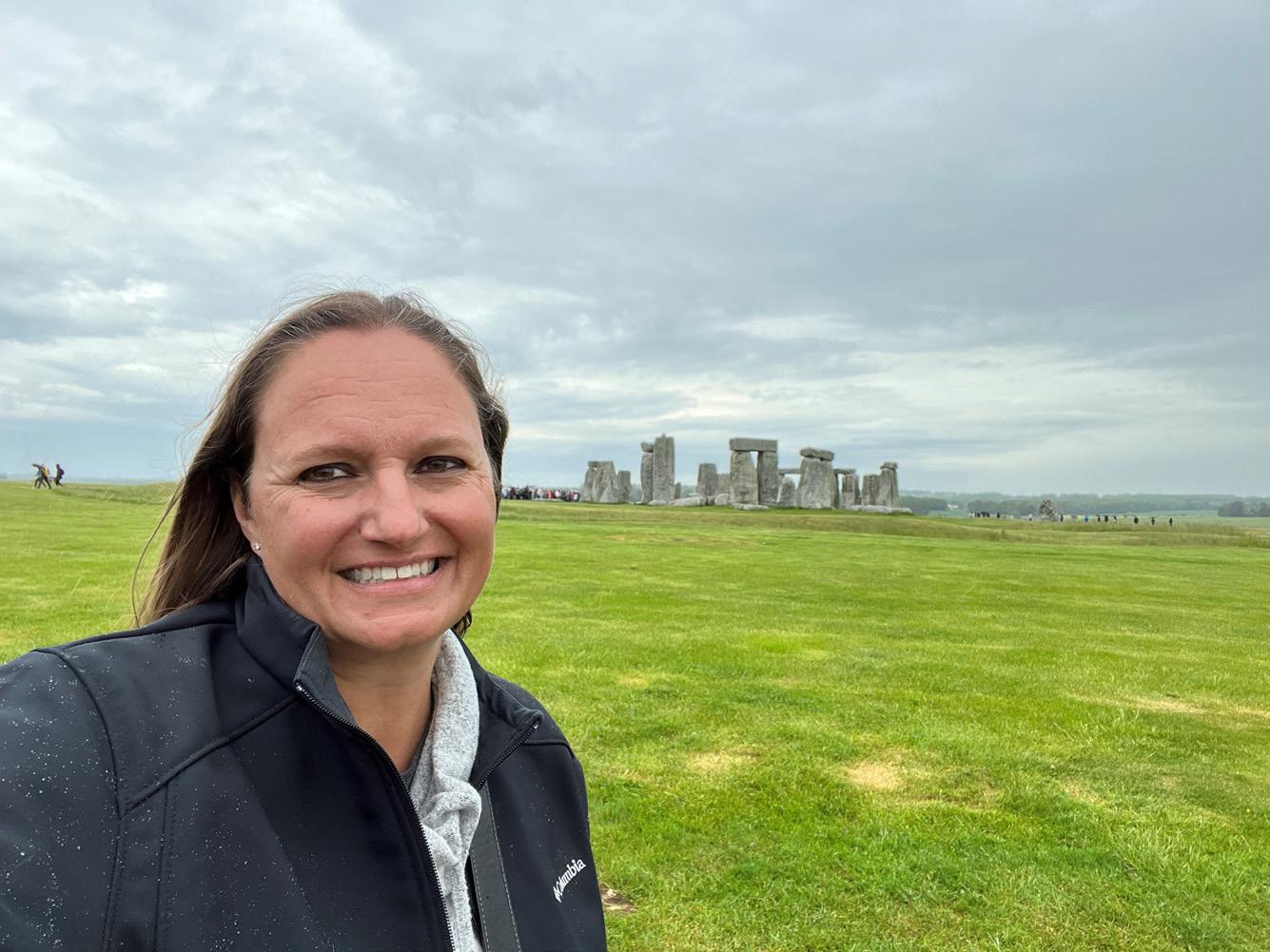


The Leadership Learning Research Center and Higher Education faculty members Dr. Kathy Guthrie, Dr. Sally Watkins, Dr. Cameron Beatty, and Dr. Tamara Bertrand Jones taught undergraduate leadership courses abroad this summer in London, England, Valencia, Spain, and Florence, Italy! Dr. Guthrie also taught the London Practicum Course abroad and engaged FSU masters and doctoral students in exploring higher education from an international lens. Students visited various institutions of higher education, including Oxford. Study abroad experiences included museum visits, theater performances, and visits to Parliament and NGOs.


Florida State University researchers spent the last year collecting and analyzing data on corequisite developmental education (DE) models in Texas as part of a four-year study that received a $1.5M grant from the U.S. Department of Education’s Institute of Education Sciences. This study was proposed in response to Texas House Bill (HB) 2223, which requires all public colleges to implement corequisite DE wherein academically underprepared students receive DE support while enrolling in college-level English and math courses.
Dr. Toby Park-Gaghan, Chair of the Department of Educational Leadership and Policy Studies (ELPS) and Associate Director of the Center for Postsecondary Success (CPS), and Dr. Christine Mokher, Associate Chair of ELPS and Senior Research Associate of CPS, are the principal investigators of the study.
This first year of the study sought to better understand how institutions made decisions about which corequisite options to offer and how student success was related to the structure and intensity of course options. Led by Park-Gaghan and Mokher, quantitative analyses revealed the greatest success among sequential corequisites, which involved student enrollment in a developmental course followed by enrollment in an accelerated college-level course in the same semester. Further, 1-credit hour corequisites seemed to be more beneficial for both math and English students, relative to 3-credit hour corequisites, particularly for lower-performing students.
Commenting on the quantitative findings, Park-Gaghan shared, “We’re excited to see success among students in
corequisite DE. The corequisite approach continues to grow in popularity, and we now have evidence to suggest what seems to be working for students.” Mokher added, “Providing information on the effectiveness of different corequisite options is especially important as more states and individual institutions adopt this approach.”
Led by postdoctoral researcher Dr. Hollie Daniels, focus groups and interviews with department chairs and faculty at six Texas institutions revealed that 3-credit hour concurrent options were among the most popular. This setup had students complete the developmental and college-level courses at the same time and in the same semester. Faculty shared that students benefited from corequisites that directly applied the skills learned in DE courses to the content in their college-level courses. However, a prevalent concern about corequisites was the considerable time commitment associated with enrolling in DE and college-level courses in the same semester.
“Speaking with instructors who are inside the classroom, we have learned a great deal about implementing this legislation. These crucial insights reveal much about the implementation decisions that were made, as well as the benefits and considerations of corequisites,” Daniels said.
The entire report from the first year of the study can be found at bit.ly/3Tuep6k. Over the next three years, the research team will continue to collect quantitative data and speak with faculty, staff, and students at Texas institutions to further explore which corequisite options are best for various student populations, as well as beneficial instructional strategies for corequisite courses.
Florida State University’s Office of Institutional Research (IR) took home awards recognizing its service and best practices in advancing the research of post-secondary education during the Southern Association for Institutional Research’s (SAIR) annual conference Oct. 1-4 in New Orleans.
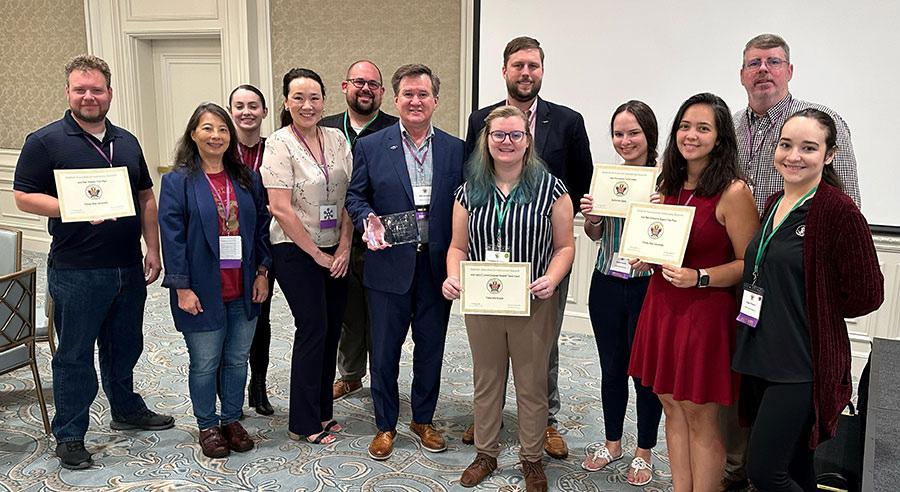
Rick Burnette, FSU’s associate provost for strategy and analytics and interim chief information officer, received the SAIR Distinguished Service Award, the association’s highest individual honor. The award recognizes individuals who have made a lifetime of contributions to the fields of institutional research and assessment.
“These recognitions from SAIR are well-deserved by our incredible Institutional Research and Institutional Performance and Assessment teams,” said Jim Clark, provost and executive vice president for Academic Affairs. “Their important behind-the-scenes work has played a key role in the strides Florida State University has made in rising in national prominence.”
Burnette, who was nominated by a former president of SAIR and the Association for Institutional Research, is the 18th winner of the award in the association’s 48-year history. He has served in many roles at FSU over 35 years.
“Data, analytics and assessment are keys to the strategic advancement of the university,” Burnette said. “The IR team, under Dr. James Hunt, has demonstrated itself as a national leader in business intelligence, analytics and data enablement. In addition to meeting copious state and federal reporting demands, they have a long tradition of promoting datainformed decision-making at FSU. Combine that with the assessment culture being cultivated by Dr. Galiya Tabulda, director of Institutional Performance and Assessment, we provide the insights needed for campus leaders to make strategic decisions.”
The team also won first place in two Best Practice Award competitions. IR’s Major Flow Through Model, with development led by IR Assistant Director Samantha Nix, claimed top honors in the Best Interactive Report competition. It is the third time in the past four years that FSU has won first place in the category. FSU’s IR website also won first place in the Best Website competition for the third time in the past six years.
Hunt, director of Institutional Research, praised the hard work of the IR team and trumpeted FSU as a leader in the IR field.
“Data and analytics are critical to all the strategic goals and initiatives at FSU, and the IR team does an incredible job of providing top-notch service to the university community,” he said. “The team works hard to be leaders in our field, and it is gratifying to see acknowledgement of these efforts from our peers.”
Members of the IR team and Office of Institutional Performance and Assessment (IPA) also delivered seven educational sessions and three half-day workshops at the conference.
Additionally, IR and IPA have a history of leadership and service to the association: Burnette is a former President of SAIR; Hunt serves as treasurer of the SAIR board of directors; Nix recently concluded service on the Nominations and Elections Committee; Tabulda was elected to serve for the next term on the committee, a post she previously held; Hunt and IR Associate Director Andrew Brady previously served on the SAIR Nominations and Elections Committee; and former IR employee Matthew Earhart was recognized for providing technical support for the proposal submission process.
Student Success Analyst Katie Gipalo received a Newcomers Travel Grant to attend the conference, while Cassie Kepple, former graduate assistant in IR and a doctoral candidate in Higher Education Administration, won the Graduate Student Travel Grant.
The Southern Association for Institutional Research is dedicated to the advancement of research leading to improved understanding, planning and operation of institutions of post-secondary education.
Tamara Bertrand Jones (higher education M.S. ’00, program evaluation ’06) has been interested in the experiences of underrepresented populations—particularly Black women— in academia since her days as a graduate student at Florida State.
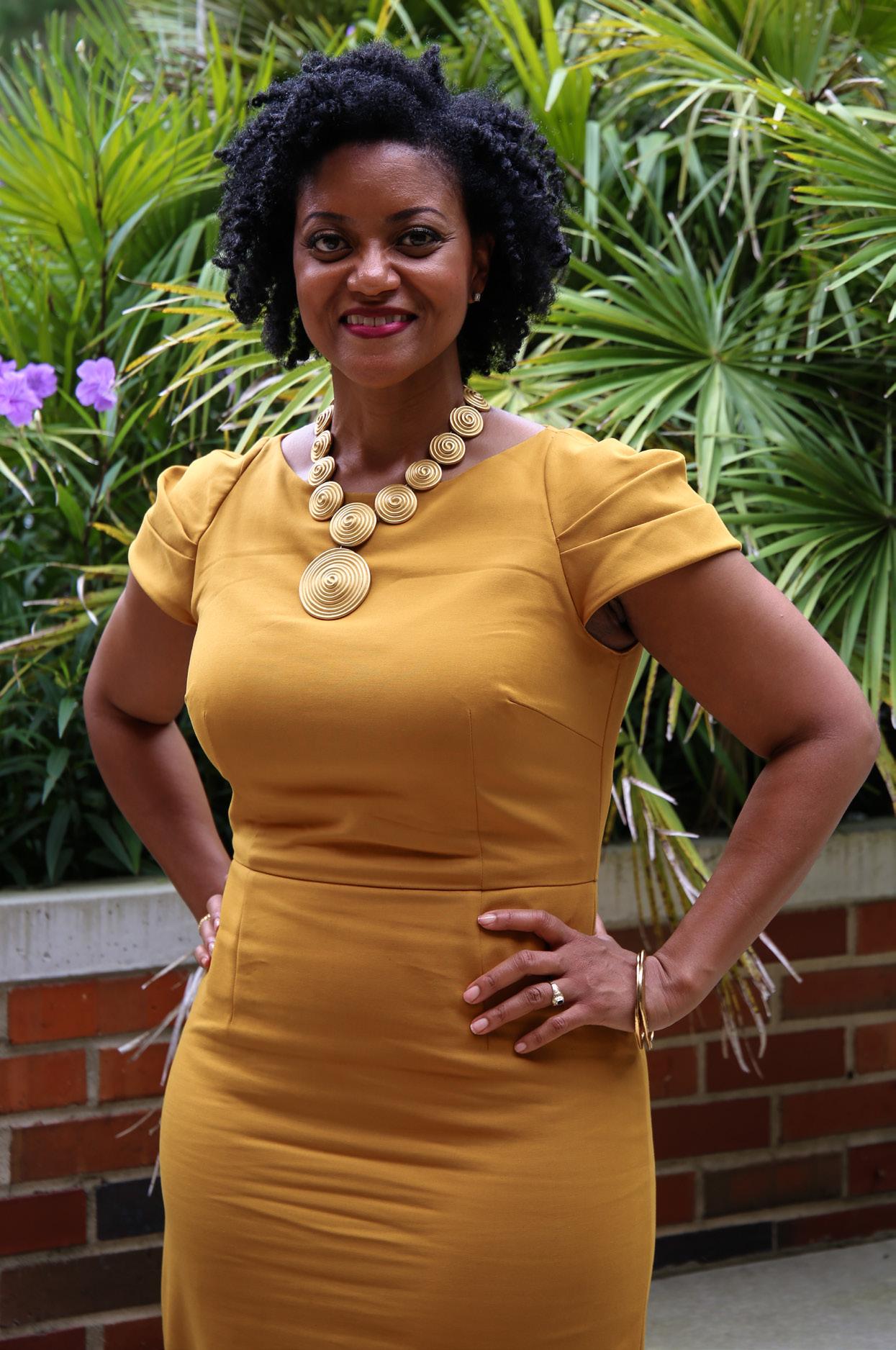
“My experience as a graduate student, particularly as a doctoral student, was very meaningful,” said Bertrand Jones. “I was a part of a great supportive network of other black women who were pursuing graduate education, and they were my role models.”
This group of women encouraged Bertrand Jones to pursue doctoral studies, and out of their relationships grew Sisters of the Academy (SOTA), of which Bertrand Jones is a founding member. SOTA is an educational network of Black women in higher education that fosters success in teaching, scholarly inquiry and service to the community. They also facilitate professional development and collaborative scholarship among Black women in higher education. “[SOTA] was definitely a core part of the motivation for my research, but it was also our relationships, the support that we were able to provide for each other,” said Bertrand Jones. “We were able to not just support each other emotionally, but also academically in terms of being able to be critical partners of our ideas and research.”
This idea of “critical partners” was demonstrated when Bertrand Jones was preparing for her doctoral proposal and shared what she had written with two of her sister scholars. “They read it, and they said, ‘No, this is not good enough.’ It was a couple of weeks before my proposal presentation, and they tore it up!
“They really challenged me. I had to rewrite my proposal in a week, because I needed to submit it to the committee. It was one of the most stressful things that I’ve ever done, but it was so impactful because it was my friends who were challenging me, who were supporting me and who were very clear about what the standard was and how they could help me meet that standard.” This experience became the foundation for how Bertrand Jones thinks about peer relationships, mentoring and the development of scholarly identity.
The relationship with her network, the formation of SOTA, and her own experiences being a Black woman in the academy led Bertrand Jones to study this area in a more
systematic way. “I realized some things were happening that were not just my experience. I think sometimes as women, we have that feeling of, ‘Is this just me?’ And then you talk to other women and find out it’s not just you,” she said. “That validation has been very impactful because it’s not just a personal individual experience. It’s this collective experience that signals to others that there’s something deeper here. There’s something systematic that might be happening that we need to examine.”
Bertrand Jones returned to Florida State in 2010 to further pursue this line of research as an associate professor of higher education, but the road to this research didn’t start smoothly. “When I was a new scholar, someone told me that my research on Black women was kind of navel gazing. He was downplaying the need to study myself, that it’s not important in the academy. So I thought, ‘Maybe I should focus on all women or women of color more broadly, and so I shouldn’t do this work.’ I tried to, but it didn’t feel genuine to me, because that’s really not what I was interested in.”
A conversation with Carolyn Herrington, professor in the Department of Educational Leadership and Policy Studies, became a pivotal moment in Bertrand Jones’ career. They set up a meeting to talk through feedback and what Bertrand Jones should be doing to prepare for tenure and promotion. “[Herrington] read my statement that I had submitted to the tenure and promotion committee and said, ‘Your work is about Black women, right?’ I said, yes, and she said, ‘Well, that’s not what you said in this statement. You talked about your work being about all students, and that’s not who you are. That’s not what your work does. Own your work, because that’s the contribution that you’re making. Your perspective on this work is needed, and I need you to feel comfortable and confident in it.’”
From that point on, Bertrand Jones took that to heart. “She affirmed me. My work is about underrepresentation; it’s about equity and diversity and inclusion, and I have a particular focus on Black women. That doesn’t mean that I cannot speak to different types of underrepresentation or oppression, but this is my focus. And so, doing that was very freeing. I’m grateful to her for having that conversation with me to help me to be okay with doing the work that I wanted to do.”
For Bertrand Jones, that experience has not only contributed to her own development as a scholar but has also led her to encourage her students to do the same. “I want them to be able to articulate why they have an interest in these topics and their personal experiences,” she said. “That’s what research is; it’s about how we view our world around us that generates these questions that we then go to explore and being unapologetic in that.”
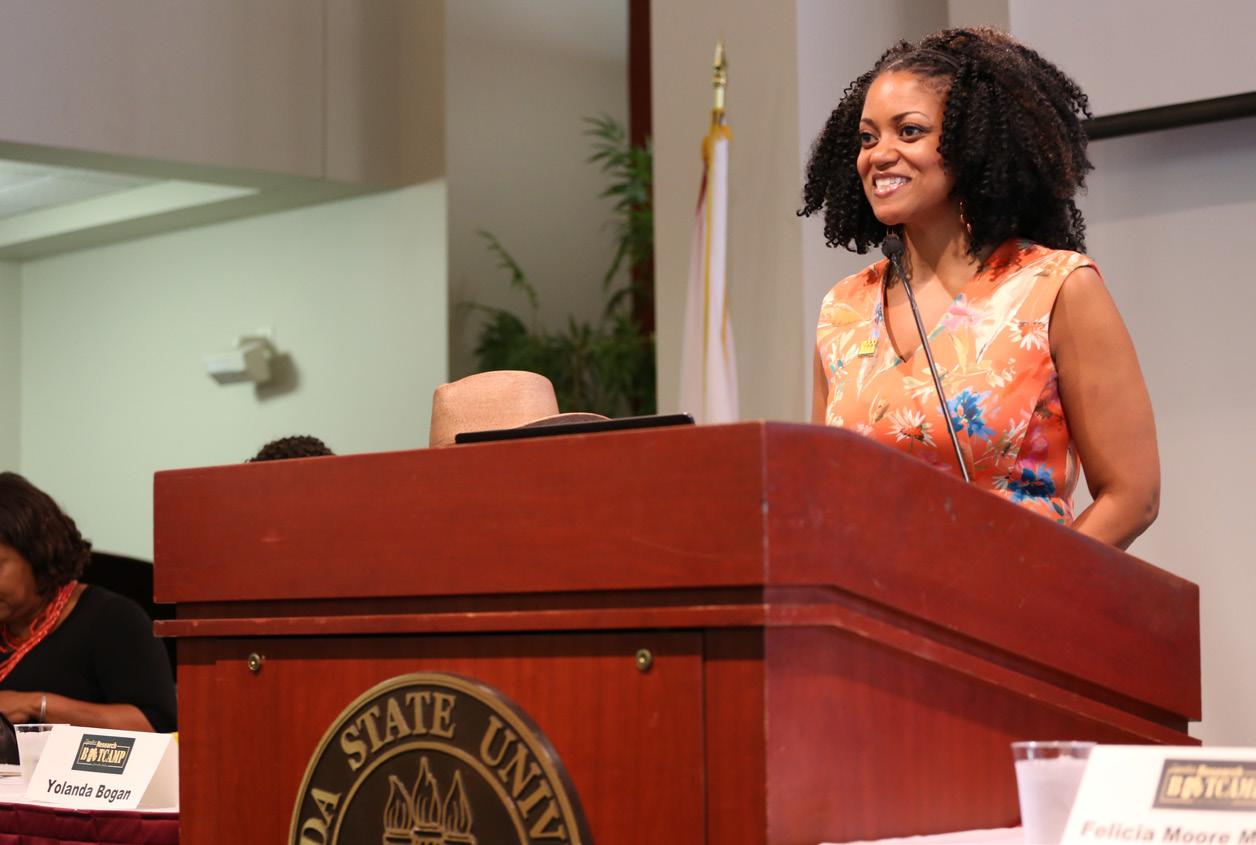
Bertrand Jones often talks to her students about debunking the myth of unbiased research. “All of our research comes from our personal experiences, whether it’s questions that we’ve had from observations that we made of our environments or questions that have come up from something that we’ve read in our personal experiences. It’s all biased in that way; it comes from individual people who’ve come up with these questions and so they’ve designed these pathways to understand them.”
The next research pathway Bertrand Jones plans to head down is related to mindfulness and contemplative practices. As work and home are starting to blur even more with the COVID-19 pandemic, she believes it’s even more important now for individuals to ensure they are developing themselves as a complete person—physically, mentally and spiritually.
The idea for this research was sparked by the work of a former doctoral student of hers, Estée Hernandez (higher education Ph.D. ‘19). Hernandez was doing research on women and their scholarly identity development, and she came across the story of Coyolxauhqui, the goddess of the moon who was dismembered by her brother according to Aztec mythology.
This idea of the female being in parts and pieces resonated with Bertrand Jones.
“[Before the pandemic] it was very easy to separate ‘home Tamara’ and ‘work Tamara,’ and never the two shall meet. And especially as a woman and a Black woman, that’s largely how I’ve lived my life. Many women in academia feel that we’re in these parts and pieces and not fully whole. I can’t be all ‘home Tamara’ in this space. I don’t want to fully show up here because that might be too much or offensive or someone may not like it. So, we put up these boundaries and we create these separations, these parts and pieces of ourselves.”
The mindfulness research has helped Bertrand Jones think about how women can bring their full selves to the academy rather than split themselves into these parts and pieces. “I’ve learned that it’s not just the individual work that we need to do, but the systemic and the institutional work to address the notion that we have to separate these parts of ourselves.”
This summer, Bertrand Jones was able to incorporate some mindfulness activities during the virtual SOTA research boot camps with daily affirmations and meditation as well as physical movement each day. “The women acknowledged the fact that this professional development was holistic and spoke to all of the parts of themselves that typical professional development doesn’t,” she said.
Bertrand Jones is excited about the direction her work is heading. “I want to talk about how women can be fully embodied, how they can bring their full selves to these spaces and not be bound by sexism, racism, ableism or any other types of oppression that we experience on a daily basis. I want to know how we can transform the systems that we are working within as fully embodied women so that other women who are coming behind us don’t feel that they have to be disembodied in order to engage in this work. That, to me, is femina perfecta.”
Florida State University is working to enhance its record of student success and equity well beyond its campuses.
The Collaborative Lab for the Advancement of Student Success, or CLASS, represents a joint effort of the College of Education and the Division of Undergraduate Studies that answers a national call to strategically improve undergraduate education so that it advances equity and better serves a more diverse student body.
CLASS will be housed at FSU’s Center for Postsecondary Success (CPS), one of the country’s oldest university-based research centers that focuses on student success and equity in higher education.
The lab will actively engage in translational scholarship, sharing the latest research and most groundbreaking innovation happening around the country so that good practices can be adopted nationally.
The lab will study student-success programs at FSU – to assess what works and for whom and under what conditions. It also will disseminate related findings nationally so that other institutions can learn from FSU’s example.
CLASS is co-directed by Shouping Hu, the Louis W. and Elizabeth N. Bender Endowed Professor of Higher Education and the founding director of FSU’s Center for Postsecondary Success (CPS), and Joe O’Shea, an associate provost and the dean of the Division of Undergraduate Studies.
“We at CPS have played important roles promoting student success and equity nationally through externally funded research projects since its inception in 2014,” Hu said. “We are excited to partn er with various units on campus and scholars across the country to identify and amplify effective programs and practices that can continuously enrich student experiences.”
CLASS will include collaboration with other units, such as the Center for Academic Retention & Enhancement, or CARE, and the Office of Institutional Research.
“FSU’s nationally recognized strategies have raised retention and graduation rates while nearly eliminating disparities between demographic groups,” O’Shea said. “We are at
the forefront of this work nationally, and sharing our and others’ research will help improve the ability of institutions to accelerate student success and equity.”
The CLASS initiative comes at a time of particular scrutiny on institutions’ ability to promote equitable and effective learning environments for students of all backgrounds.
A group of renowned university presidents and higher education leaders issued a report this month titled “The Equity-Excellence Imperative: A 2030 Blueprint for Undergraduate Education at U.S. Research Universities.” The report, authored by members of the Boyer 2030 Commission, calls on universities to recognize that “excellence and equity are inextricably entwined, such that excellence without equity (privilege reproducing privilege) is not true excellence, and equity (mere access) without excellence is unfulfilled promise.”
Through the CLASS initiative, its directors say, FSU will further build on the university’s strong foundation of equity and excellence and continue to serve as a leader in those areas, paving the way for other schools to do the same.
Last year, FSU launched the Journal of Postsecondary Student Success (JPSS), a quarterly, open-access, interdisciplinary journal that publishes peer-reviewed research, editorials and practitioner reports related to student success in higher education. JPSS is also an initiative led by Hu and O’Shea, faculty members in FSU’s nationally ranked higher-education program.
Student success remains at the core of FSU’s four-year streak as a Top 20 national public university in the U.S. News & World Report rankings.
Also, the Association of Public and Land-grant Universities last year selected FSU for the Degree Completion Award, recognized as the most prominent in the country for student success. The APLU honored FSU for achieving a record-high 74% four-year graduation rate while nearly eliminating gaps by race, ethnicity and income level.
“We have fully embraced the imperative to improve and promote equity in our institutions, which is fundamental
to advancing excellence in higher education,” O’Shea said. “At FSU, we continue to develop evidence-based practices so that every student can thrive while they’re here and graduate empowered to make a difference in the world.”
CLASS will analyze FSU’s network of student support services, which includes its renowned CARE program. CARE works with historically underrepresented populations, such as first-generation students and Pell Grant recipients, and recognizes their unique needs.
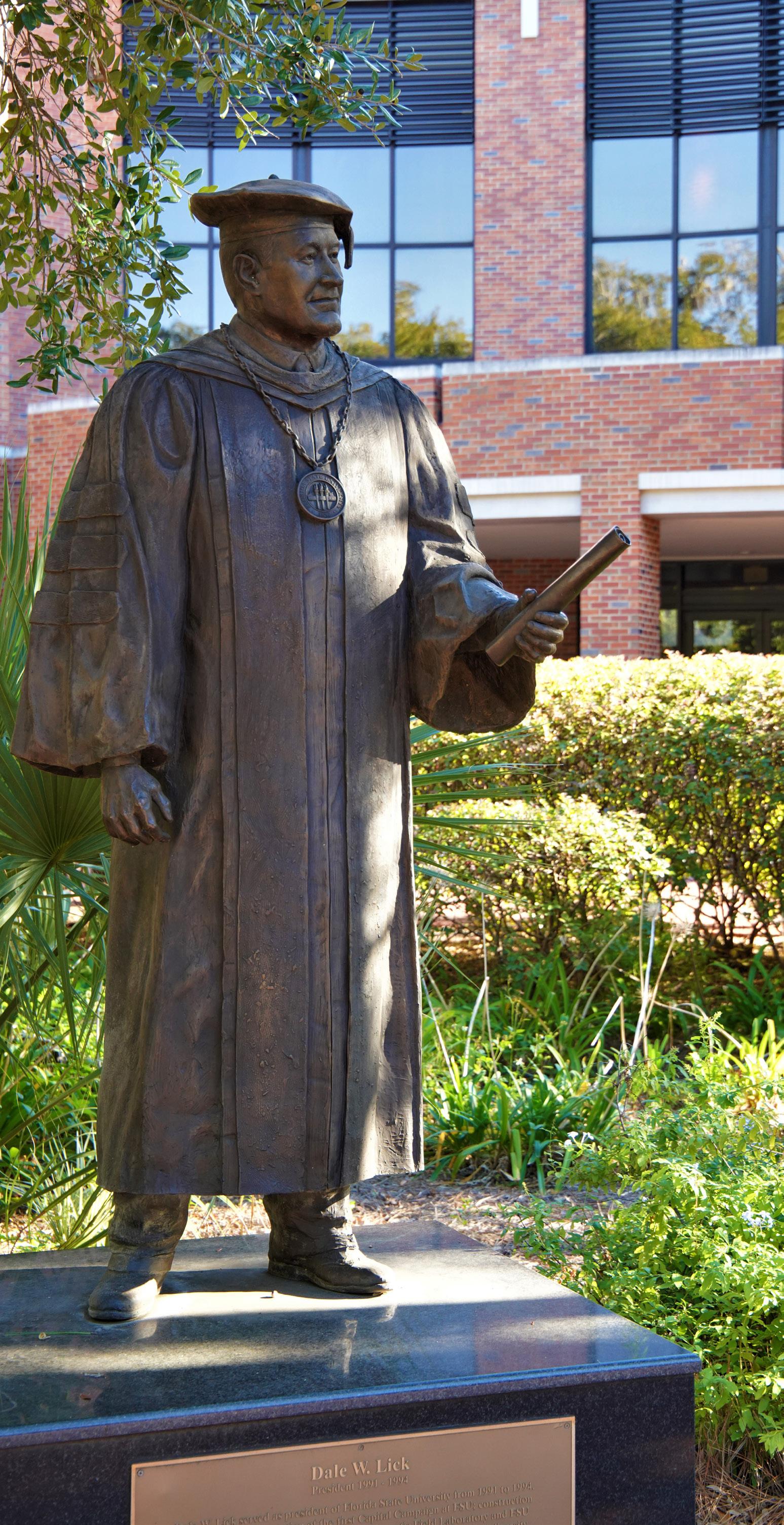
Administrators tout the university’s focus on holistic development and investment in programs and initiatives dedicated to student success and to helping undergraduates excel at FSU and beyond.
CLASS will analyze these investments and the six pillars that underpin the FSU student ecosystem: a success team behind every student; learning communities; enhanced support for teaching; experiential and global learning; leadership and personal development; and college-to-career guidance.
FSU recently boosted its Advising First network, growing its team of academic advisers, guides, college life coaches and staff to nearly 100. The team serves students directly and functions as the central training operation for all university staff who serve in an advising capacity.
“We know that by learning from FSU’s own exemplary programs, and by translating the latest scholarship and innovation to be used by higher education leaders, the work produced by CLASS can inform research, policy and practices for student success and equity in postsecondary education everywhere,” Hu said.
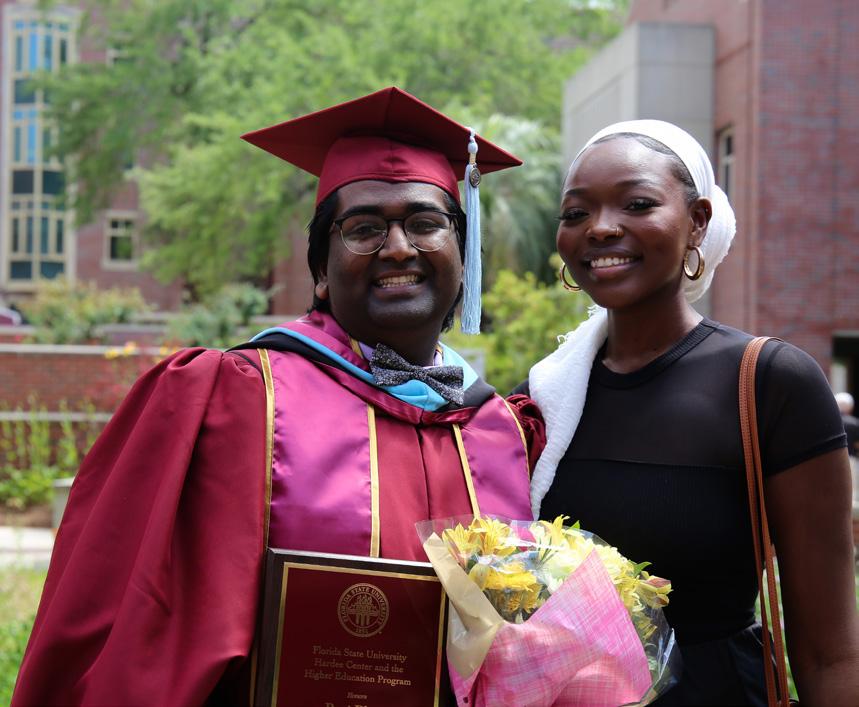
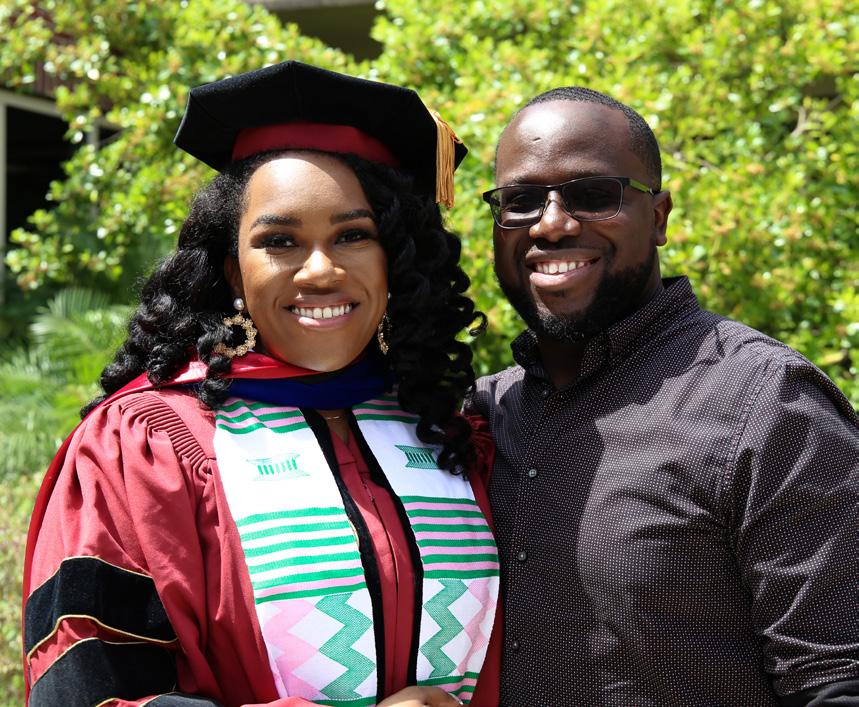

Amy
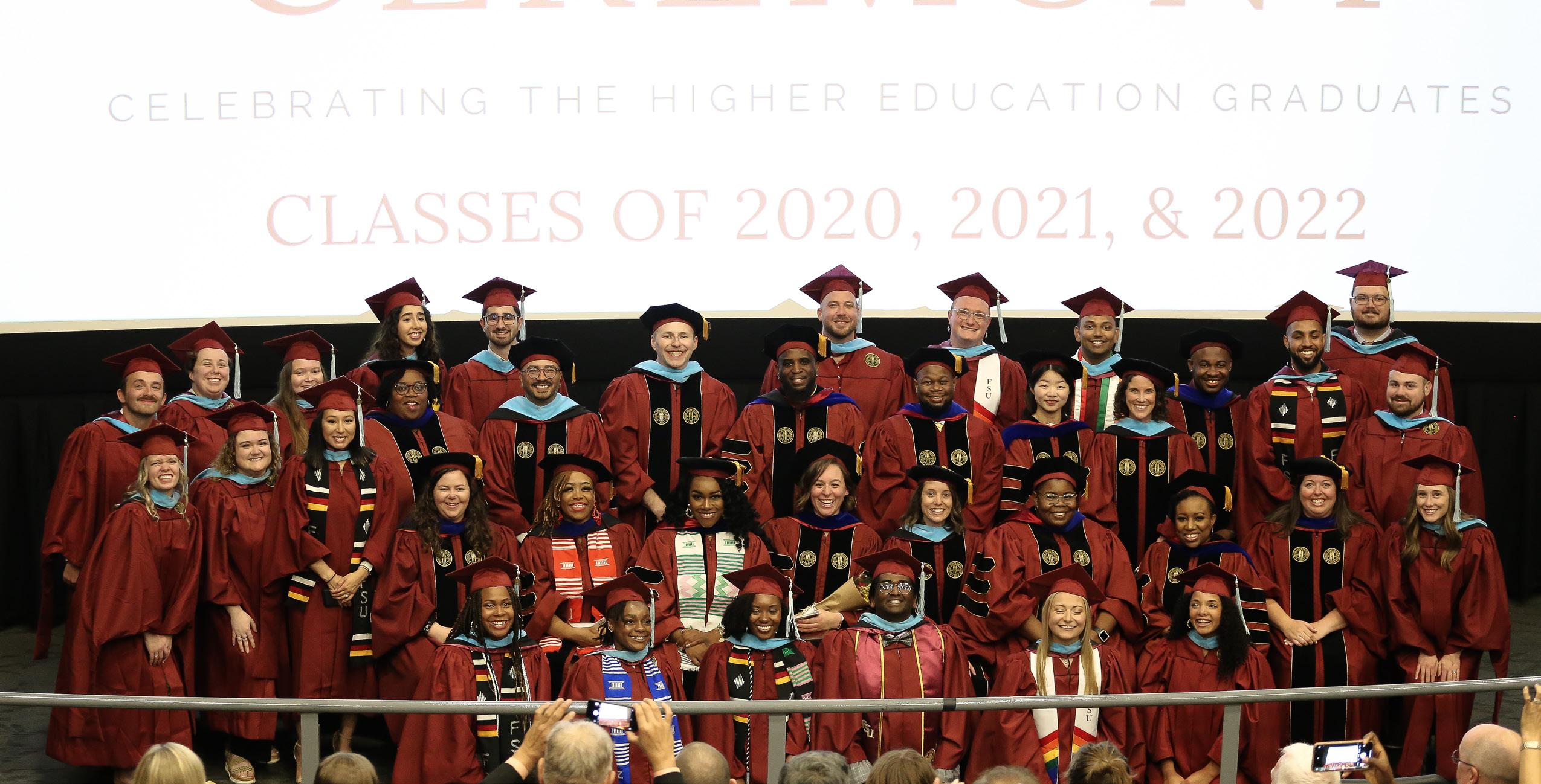
A Florida State University program that helps and inspires Gadsden County students to finish high school and college is about to get bigger and stronger.

FSU’s Upward Bound will receive about $3.5 million from the U.S. Department of Education to continue to build its decades-long Gadsden County operations and to expand to Jackson County, said DeOnte Brown, assistant dean of undergraduate studies and director of the university’s Center for Academic Retention and Enhancement, or CARE, which oversees the program.
CARE will receive about $2.1 million for Upward Bound in Gadsden County and about $1.4 for Jackson County. Both grants cover five-year cycles.
“I’m very excited that we’ll receive additional funding to support and expand the life-changing work we do,” Brown said. “I’m ecstatic and proud of the team we’ve put together, because this expands our reach.”
The U.S. government created Upward Bound as part of the Economic Opportunity Act of 1964. FSU launched it in Gadsden County in 1989, and administrators hail it today as one of the longest continuously funded Upward Bound programs in Florida.
The program serves traditionally underrepresented students in high school and gives them information, instruction, motivation, tutoring, testing help and more to ensure that they graduate from high school, then enroll in and graduate from college.
Brown saluted Upward Bound Gadsden County for a 100% high school graduation rate for students in the program in 2020 and 2021. And three students from this year’s program will enroll at FSU this summer or fall, he said.
Over the past two years, 80% of students enrolled immediately in college, and 95% proved proficient in Florida Standards Assessments.
“To have been consistently funded in Gadsden County since 1989 means the model we have works,” said Brown, an Upward Bound alumnus himself. “We’ve been able to graduate students from high school and get them enrolled in college. I’m a prime example of that.”
Brown made straight As and served as a campus leader in the 2000s when he attended East Gadsden High School, now Gadsden County High. Upward Bound helped him to explore colleges beyond Tallahassee and to discover an interest that would remain dear to him: the arts.
The program has stayed the course, with a “Saturday Academy” that conducts information workshops and takes students to see productions such as “Hamilton” or “The Nutcracker.” Upward Bound FSU also offers a Summer Residential Program that allows students to experience living and learning on a college campus.
“It exposed us to something different and expanded our horizons,” Brown said about his experience in Upward Bound. “And the staff members were there to support us and be our biggest cheerleaders.”
Likewise for LaKesha Brown, an Upward Bound alumna who has worked in FSU’s program for more than five years. She recently became Gadsden County project director.
Like DeOnte Brown – no relation – she is a first-generation college graduate, as are all full-time staff in Upward Bound Gadsden County.
CARE will use the Jackson County grant to focus primarily on students at Sneads High School, while its Gadsden County grant will continue to focus primarily on students at Gadsden County High School.
CARE officials say they expect Upward Bound to serve 80 students in Gadsden County and 60 in Jackson County beginning in the 2022-23 school year.
DeOnte Brown said CARE will use the new funds to hire additional staff members and to provide student experiences in Gadsden and Jackson counties, including college tours and ACT/SAT prep and college planning workshops.
“Those are big pieces of the college-going process, allowing students to actually see themselves on a college campus,” he said.
The Association of Public and Land-grant Universities (APLU) honored Florida State University with a national award acknowledging the university’s comprehensive efforts to support all students in earning their degrees.
Florida State was announced as the winner of the APLU 2021 Degree Completion Award in a virtual ceremony during the association’s annual meeting Nov. 16. The award is recognized as the most prominent in the country for student success.

The APLU selected FSU for achieving a record-high 74 percent four-year graduation rate last year while nearly eliminating gaps by race, ethnicity and income level.
“Student success is at the heart of Florida State University’s mission and addressing equity gaps is one of our top priorities, so it is especially meaningful to be recognized by the APLU with the Degree Completion Award,” said President Richard McCullough. “Public universities are amazing engines of social and economic mobility, and that’s why we’ve worked so hard to achieve one of the top graduation rates in the country.”
FSU worked holistically, inside and outside the classroom, to redesign the way the university supports, engages, and challenges students. The efforts were driven by data and assessment, collaborative partnerships across campus, and a sustained commitment to shared goals.
“Our 74 percent four-year graduation rate is the best in Florida and among the top 10 in the nation, and we’ve raised these numbers while virtually erasing disparities between underrepresented and traditional student populations,” said Sally McRorie, provost and executive vice president for Academic Affairs. “That’s a testament to the commitment we have to help our students — no matter their background.”
Analyzing student success data is an integral part of FSU’s efforts to address and track inequities in graduation rates. Students who entered in 2009 had a 62 percent graduation rate overall, but that rate was 53 percent for Black students and 58 percent for Pell-eligible students, with transfer students even further behind.
“We set out to prove that demographics were not destiny, that all of our students, regardless of their background, could grow to their fullest potential at FSU and achieve at the highest levels,” said Joe O’Shea, associate provost and dean for Undergraduate Studies.
The university expanded first-year student engagement programs, invested in experiential learning, adopted new approaches to advising, and leveraged its longstanding CARE program, which supports first-generation college students from transition to college through graduation.
“We expanded access to experiential learning and elevated the financial aid that we provide to students so that they can participate in internships, undergraduate research, and international study at much higher rates,” O’Shea said.
FSU launched its Center for the Advancement of Teaching to support faculty as they redesigned courses around students’ needs and created more inclusive learning environments. The university also founded a Learning Assistant Program in which undergraduates who have successfully completed courses are invited back to work in them, helping students learn the material.
“We applaud Florida State University for their critically important work to advance students’ success, equity and
completion,” said APLU President Peter McPherson. “The university’s comprehensive approach to increasing support for students and addressing equity gaps stands as an important example of how institutions can take a campuswide approach to advancing equity and degree completion.”
The Degree Completion Award is one part of APLU’s robust work to advance college access, equity, and completion. The award complements the association’s broader student success work, including its Powered by Publics initiative, which convenes 125 APLU member institutions collaboratively working to tackle barriers to student success in the areas of affordability, teaching and learning, and holistic student supports. Collectively, the schools have pledged to aim to increase college access, cut the equity gap in half, and award hundreds of thousands more degrees by 2025.
A panel of reviewers examined the applications to determine the finalists. Florida Atlantic University and the University of Illinois Chicago were the other finalists for the 2021 Degree Completion Award.
APLU is a research, policy, and advocacy organization dedicated to strengthening and advancing the work of public universities in the U.S., Canada, and Mexico. With a membership of 244 public research universities, land-grant institutions, state university systems, and affiliated organizations, APLU’s agenda is built on the three pillars of increasing degree completion and academic success, advancing scientific research, and expanding engagement. Annually, member campuses enroll 5.0 million undergraduates and 1.3 million graduate students.

Da’Shay Templeton always wanted to be a teacher, but more than that, a game-changer.
Growing up in Los Angeles, she witnessed up close the effects of school policing and school criminalization on minority students.
She came to reflect on how she could help.
“If I could change policies, then I could effect change beyond just the students I interact with every day,” she said.
She believes she’s on her way to doing so, at least trying to do so, as an accomplished researcher and doctoral candidate – and mother of three young children – at Florida State University’s College of Education.
This year alone, she has earned funding from four prestigious fellowships and awards:
• The Ford Dissertation Fellowship, which seeks to increase the diversity of the nation’s college and university faculties by increasing their ethnic and racial diversity, maximize the educational benefits of diversity and increase the number of professors who can and will use diversity as a resource for enriching the education of all students.
• The Philanthropic Education Organization’s (P.E.O.) Scholar Award, which is a one-time, competitive, meritbased award that aims to recognize and encourage academic excellence and achievement by women in doctoral-level programs.
• The American Educational Research Association’s (AERA) Minority Dissertation Fellowship Program, which aims to enhance the racial and ethnic diversity of faculty, scholars and researchers in the field of education research.
• Funding from the AERA Grants Program, which
provides research grants to faculty at institutions of higher education, postdoctoral researchers and other doctoral level scholars.
As a result of having received and accepted the first Ford and PEO fellowships, Templeton declined the AERA awards but will continue to participate in their fellows’ workshop and presentation session at the 2023 AERA Annual Meeting. Templeton emphasized the significance of the awards for the access and opportunities they give to advanced students.
“They give students a level of credibility that is hard to get without a publication or something,” she said.
After earning her master’s degree and teaching certificates from San Francisco State University, Templeton started researching U.S. doctoral programs that would prepare her for a research faculty career in education policy. She wanted a program where she could start a family while pursuing her Ph.D.
While visiting the College of Education, Templeton met with a student mentor, Samantha Nix, who praised the support she got from the FSU College of Education during her pregnancy. That sealed her decision, she said.
“I chose FSU because I knew the fully funded program would challenge me academically, prepare me professionally and support my decision to grow my family,” Templeton said.
Templeton has had all three of her children since she enrolled in the College of Education’s Higher Education program in 2016. All the while, she has conducted research, applied for funding and published peer-reviewed articles that underscore her passion for policy changes in schools.
Her multimethod dissertation research investigates ways in which material and ideological forces of white supremacy disparately affect school children, and it explores disparities in
public education by assessing the effectiveness of policies and programs on vulnerable youth.
Her research prioritizes the historical and contemporary experiences of California public-school students who are Black, indigenous, Latina/o/x, cis gender and genderfluid.
The work is personal to Templeton, who remains guided by her experiences as a Black and indigenous Puerto Rican mother and as former poor and policed public-school student from Los Angeles.
“I wanted to be able to compare my lived experience with the students I’m studying to give it more authenticity and to paint a fuller picture of what it looks like to be criminalized in L.A.,” she said. “My lived experience directs my research pursuits.”
Amid the COVID-19 pandemic and a summer of social justice movements in 2020, Templeton moved back across the country to California, where she could be closer to family. She continues her studies online as she aims to wrap up her dissertation ahead of her May 2023 graduation ceremony, which she plans to attend.
Despite the stress of completing a Ph.D. while raising a family, she said, “it’s really fulfilling because my greatest accomplishments — having my three boys — are already done.”
To learn more about these fellowships or similar awards, visit the Office of Graduate Fellowships & Awards at ogfa.fsu.edu. For more information about Templeton and her research, visit dashaytempleton.com.
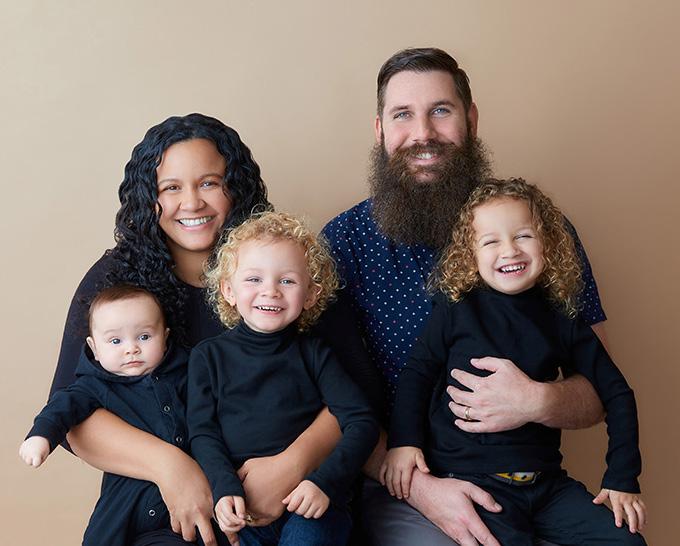
Q: What is the title of your study?
A: Lord, Why Did You Make Me a Black Woman?: Examining the Intersection of Race and Gender for Black Women Senior-Level Leaders at Historically Black Colleges and Universities and Historically White Institutions
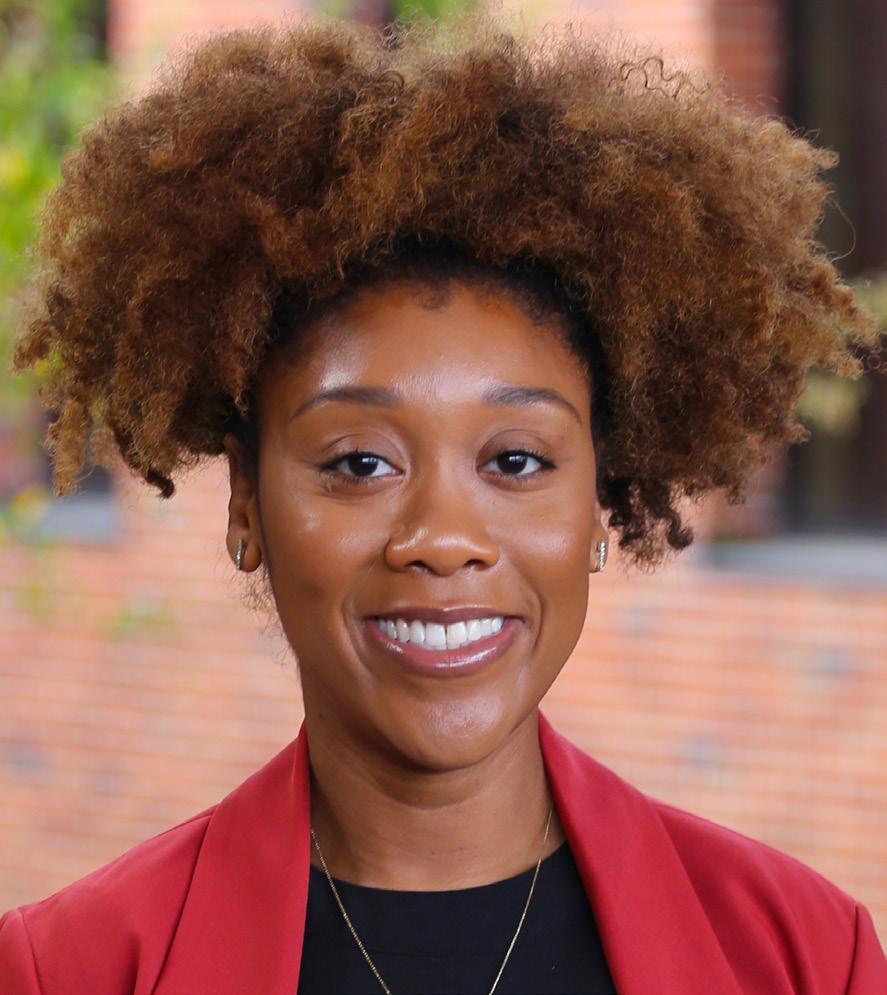
Q: What is your study about?
A: I explored how race and gender impacted the experiences of Black women senior-level leaders at HBCUs and HWIs. Specifically, I used a critical narrative inquiry methodology to examine how Black women obtain and navigate senior leadership and to what extent the institution impacts their intertwining racialized and gendered experiences. I interviewed nine women and captured their stories by giving them a platform to share experiences related to power dynamics, sexism/racism, empowerment, and community. I weaved together a discussion that aligned with my theoretical frameworks: Black Feminist Thought, Intersectionality, and Misogynoir.
Q: How you will use the fellowship?
A: I plan to use the fellowship for transcription and editing services.

“I am thankful to Dr. Lawrence Morehouse and the Florida Education Fund for their financial support during the dissertation stage of my doctoral journey. I cannot adequately describe how I feel knowing they have faith in me and my research.”
Q: What is the title of your study?
A: The Experiences of Black Chief Diversity Officers at Predominantly White Institutions During the Anti-Critical Race Theory Movement
Q: What is your study about?
A: The study will examine the experiences of Black Chief Diversity Officers (CDOs) at Predominantly White Institutions (PWIs) during the anti-Critical Race Theory (CRT) movement. My research focuses on how CDOs experience structural and systemic racism at PWIs, how it influences CDOs implementation of organizational change, and how the anti-CRT movement affects CDOs’ ability to perform in their role. Critical Race Theory is the theoretical framework for the study. Qualitative case study is the research methodology. In this research, I will employ semistructured individual interviews with ten CDOs that will be analyzed using Counterstory.
Q: How you will use the fellowship?
A: I will use the McKnight Doctoral Fellowship to fund my research by purchasing participant incentives, transcription services, coding software, and attending national conferences.
The Toni Jo Mason Foundation has created scholarships for people with physical disabilities at several schools and colleges affiliated with Mason, including here in the FSU College of Education. In 2022, Oksana Kozlova, a master’s student in the higher education program, became the first Dr. Toni Jo Mason scholar at FSU.

Kozlova first came to the U.S. from her native Russia in 2016 thanks to the Year of Exchange in America for Russians (YEAR) program. The YEAR program is funded by the U.S. Embassy in Moscow and seeks to foster greater cultural understanding between the U.S. and Russia. Oksana spent a year at the University of Wyoming after being selected through a competitive process that considered her outstanding academic record, leadership potential, excellent English skills and strong interest in learning about U.S. culture.
In particular, she was interested to see how the U.S. handled accessibility, noting that “Russia is very different for accessibility.” In Wyoming, she studied “linguistics and language courses, English for foreign students, and American Studies,” then taught English for students of foreign languages in Russia before looking to return to the U.S. for a master’s degree.
“There are no student affairs [offices] in Russia,” said Kozlova, so she sought an American program in higher education and began looking at schools across the country. “Let’s be honest, weather was an issue,” she joked, regarding her decision to come to Florida after her years in Russia and Wyoming. She had also looked over the faculty profiles and was excited by the work of Associate Professor of Higher Education Brad Cox.
“I saw Dr. Cox was working on autism spectrum, so there would be enough experience relating to my disability experience,” she said. Cox is the founder and executive director of the College Autism Network (CAN), a national non-profit organization dedicated to using evidence-based advocacy to improve experiences and outcomes for college students with autism.
At FSU, Kozlova secured a graduate assistantship in the Office of Accessibility Services working with students to ensure they have the accommodations that they need. She continues to be fascinated by the cultural differences she observes in the classroom. “Russian kids just see right and wrong,” she said. “Here they have the opportunity to share different experiences.”
Kozlova had the opportunity to take a course from Toni Jo Mason Foundation advisor and FSU College of Education alumnus (higher education Ed.S. ’96, Ed.D. ’99) J.R. Harding. “Oksana is a wonderful addition to FSU, the College of Education, and the student body as a whole,” said Harding. “She is an outstanding student and emerging scholar. I had the pleasure of working with her during the fall of 2021 with my IDS 1107 course that focuses on academic and social success for freshmen with disabilities. As an international student who also happens to have a disability, her perspective was unique and comments in the class were spot on. We were most fortunate to have Oksana contribute to the curriculum, mentor the students, and be unafraid to share her story.”
Recognizing the value of a different lived experience is precisely what the Toni Jo Mason Foundation celebrates and supports with the Dr. Toni Jo Mason Endowment for Excellence in the College of Education.
In 2011, West Liberty University inducted Mason into their Wall of Honor. She passed in 2013 at the age of 74, having made a significant impact on her community and the lives of those who knew her. The Toni Jo Mason Foundation was established via her estate and continues her mission of supporting educational opportunities for all.
Mason believed that the ability to overcome obstacles required an attitude of “stick-to-it-ness,” which meant never giving up on dreams, no matter how long or how hard a pathway to achievement might be. “She sort of was a mentor for me to always keep going, to push forward in a positive way,” said Iansiti. “As I think about Toni and all of her abilities (not disabilities), I think that mindset drove her—to always be pushing forward with a smile on your face—and boy, did she ever!”
Doctoral Class of 2020, Assistant Professor of Higher Education & Public Policy, Hangzhou Dianzi University, China
Doctoral Class of 2010, Vice President for Research and Policy, NASPA –Student Affairs Administrators in Higher Education
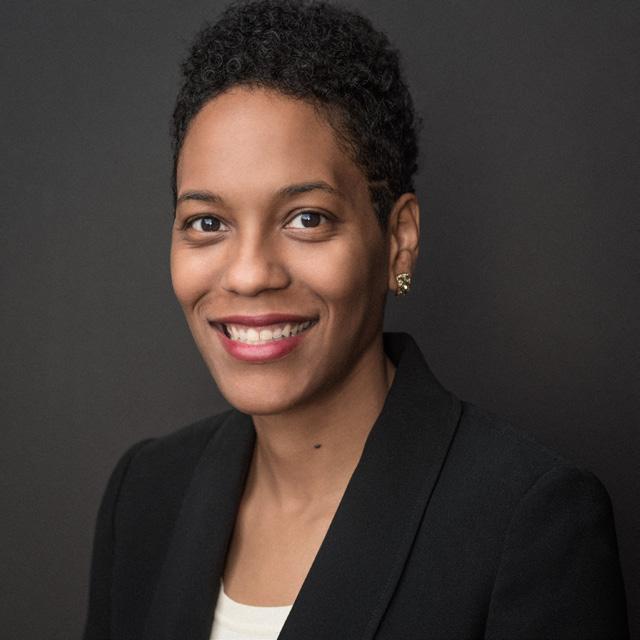
“FSU prepared me very well for a career in higher education. Each course provided timely and relevant glimpses of the field and numerous opportunities to learn from leading scholars, practitioners, and researchers. As I continue to expand my professional portfolio, I remain grateful for the many experiences at FSU that deepened my commitment to higher education and helped me find my unique voice.”
Parnell, A. (2021). You are a data person: Strategies for using analytics on campus. Stylus Publishing, LLC.
•
“FSU’s Higher Education program policy track helped to well prepare me for the faculty career starting with the Chinese Academy of Science and Education Evaluation and Zhejiang Academy of Higher Education at Hangzhou Dianzi University. While in the program, I have benefited from systematical training in research methodologies, which enables me to conduct research and publish articles independently. Also, the experience of the research assistant in Dr. Lara Perez-Felkner’ research team helps me to understand how to collaborate effectively with other colleagues/scholars as well as how to lead my own research team. In addition, the program’s policy track makes me understand the importance of practical and policy implications of empirical research thus devoting to transforming the research results into policy recommendations. To date, one of my policy recommendations was adopted at the national level, and two were adopted at the provincial level. During my time at FSU’s Higher Education program, I have been taught to be a critical-thinking, creative, inspiring, warm, and supportive person, which is one of the most important life lessons.”
Wu, J., & Zhao, T. (2022). Encouraging China’s college students to achieve sustainable careers: Evidence from structural equation modeling. Sustainability, 14(16), 9837. https:// doi.org/10.3390/su14169837
Zhao, T., & Perez-Felkner, L. (2022). Perceived abilities or academic interests? Longitudinal high school science and mathematics effects on postsecondary STEM outcomes by gender and race. International Journal of STEM Education, 9(1), 1-26. https://doi. org/10.1186/s40594-022-00356-w
Zhao, T., Su, Q., & Hu, X. (2022). The Relationships Between Family Characteristics and Undergraduate Students’ COVID-19 Responses: A Cross-Sectional Study in China. Frontiers in public health, 10, 873696. https://doi.org/10.3389/fpubh.2022.873696
Zhao, T. & Su, Q. (May 2022). Building a new ecology of “precise, inclusive and efficient” vocational education: The role of vocational education in rural revitalization. China National Democratic Construction Association.
Zhao, T., Zhang, Y., Wu, C., & Su, Q. (2021). Will anti-epidemic campus signals affect college students’ preparedness in the post-COVID-19 era? International Journal of Environmental Research and Public Health, 18(17), 9276. https://doi.org/10.3390/ijerph18179276
Zhao, T. (PI). (Sep 2022-Aug 2025). Promoting STEM-A education to achieve the school’s high-quality development. Funded by the Education Department of Yuhang. Total award CNY 2,220,000.
Zhao, T. (PI). (Sep 2022-Aug 2025). The high-quality development of the school based on Taiyan Culture. Funded by the Education Department of Yuhang. Total award CNY 1,800,000.

Doctoral Class of 2020, Assistant Professor of Higher Education in the Department of Teacher Education and Higher Education at the University of North Carolina at Greensboro
“When I began my journey, I had no idea what I would do with a Ph.D. As a mid-career practitioner, I, like many others, desired to advance my career to vice president of student affairs. I started my doctoral program with a relatively blank slate trying to learn as much as possible during my time. Throughout my experience, I had a variety of experiences, including conducting interviews and focus groups, teaching undergraduate leadership courses, serving as a teaching assistant for masters and doctoral student courses, and, most importantly, cultivating a network of friends and colleagues engaged in important work across education.
In summary, FSU afforded me the chance to develop in ways I did not believe possible. Amazing faculty that cared about my success made my time at Florida State University exceptional. As a faculty member, I aspire to emulate many of the qualities of those who invested in my education. I frequently tell people that FSU’s faculty are some of the most intelligent, compassionate, and supportive people I have ever met. The experience of getting to know them and working with them has made me a better professional for our field and for the students I work with. Today, I still collaborate with many of them and FSU students making Florida State not only a place that prepared me, but still is an active part of my development.”
Beatty, C. C., & Ford, J. R. (under contract). Engaging Black College Men Engaging in Leadership Learning. Information Age Publishing
Matthews, D.Y., Ford, J. R., & Kepple., C.R. (accepted). Building first generation student satisfaction: The role of academic advising. Journal of First-Generation Student Success.
Jones-Kaler, C., Briscoe, K., Moore, C. M., & Ford, J. R. (2022). Yes, teaching and pedagogical practices matter: Graduate Students’ of Color stories in hybrid HESA programs. Urban Review. Advanced online publication. https://doi.org/10.1007/s11256-022-00645-2
Ford, J. R. (2022). In the trenches: Just trying to make it as Black men in early career faculty roles. International Journal of Qualitative Studies in Education. Advanced online publication. https:// doi.org/10.1080/09518398.2022.2127014

Griffith, T. O. & Ford, J. R. (2022). Say her name: The socialization of Black women in graduate school. Journal of Student Affairs Research and Practice. Advanced online publication. Advanced online publication. http://doi.org/10.1080/19496591.2022.2042006
Smith, T. C., Isreal, A., Ford, J. R., & McDonald, A. (2022). I too dream: Using appreciative advising to combat student retention challenges at HBCUs. About Campus: Enriching the Student Experience, 26(5), 14-18.
Ford, J. R. & Propst, B. (2022). From #BlackLivesMatter to critical hope: Reflecting on leadership practices in higher education. In K. L. Guthrie & Kerry L. Priest (Eds.), Navigating Complexities in Leadership: Moving Toward Critical Hope (pp. 143-152). Information Age Publishing.
Ford, J. R., & Kelly, A., & Bloom, J. L. (2021). Challenges and opportunities: Reinventing faculty advising in the era of COVID-19. Journal of Appreciative Education, 26(8), 32-42.
Ford, J. R. (2021). Reimagining and reframing: Using appreciative education techniques during COVID-19. The Journal for Research and Practice in College Teaching, 6(2), 1-4
Wallace, J. K. & Ford, J. R. (2021). “They don’t value my knowledge”: Interrogating the racialized experiences of Black first-generation doctoral students in HESA programs at HWIs. Journal of First-Generation Student Success, 1(2), 127-144.
Jackson, L., Ford, J. R., Randolph, C., Schleiden, C., Harris-McKoy, D., & McWey, L. (2021). School climate as a link between high school Black males’ math identity and outcomes. Education and Urban Society, 52(7), 1-19.
Master’s
“What I appreciated most about the higher education program was the practical experiences provided to us. The opportunity to intern in three different units across campus allowed me to explore a variety of student affairs areas. In addition, the cohort based model and outstanding faculty were instrumental to my understanding and learning of our field. My master’s experience prepared me well for student affairs world of work and later, my doctoral program at Iowa State University. I am thankful to be a part of the LifeNet.”
Guardia, J. R. (2021). La perspectiva de un practicante (A practitioner’s perspective): Latinx/a/o-based sororities and fraternities. In C. E. Garcia & A. Duran (Eds.) Moving culturallybased sororities and fraternities forward: Innovations in practice (pp. 87-102). Peter Lang Publishing.
Miranda, M. L., Garcia, K. D., & Guardia, J. R. (2020). NALFO: A retrospective y hacia adelante. In P. A. Sasso, J. P. Biddix, & M. L. Miranda (Eds.), Foundations, research, and assessment of fraternities and sororities: Retrospective and future considerations (pp. 39-46). Sterling, VA: Myers Education Press: Stylus.
Guardia, J. R. & Salinas, C. (2018). Latino male leadership: A social justice perspective. In K. L. Guthrie & V. S. Chunoo (Eds.). Changing the narrative: Socially just leadership education (pp. 145-157). Charlotte, NC: Information Age Publishing.
• NASPA Pillar of the Profession, 2023
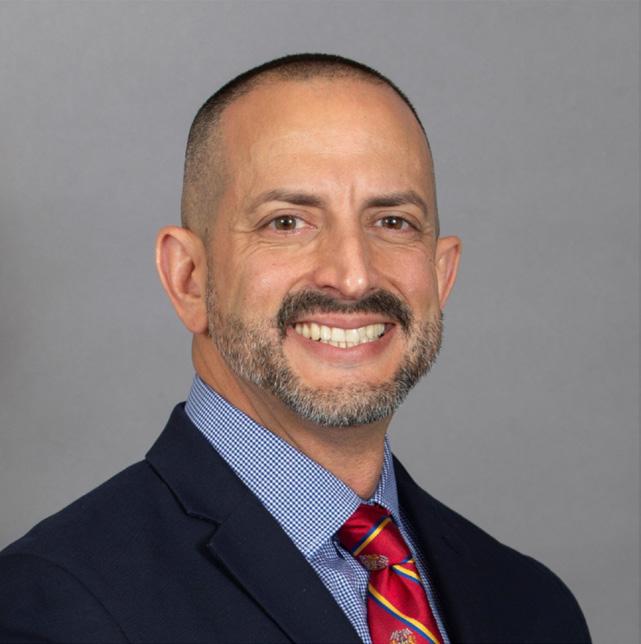
• NASPA Institute for New AVPs Director & Faculty, 2023
• NASPA Region IV-East Fred Turner Award for Outstanding Service to NASPA, 2022
• NASPA Escaleras Institute Co-Director & Faculty, 2022
• NASPA Latinx/a/o Knowledge Community Outstanding Senior Student Affairs Officer, 2020
• AFA Sue Kraft Fussell Distinguished Service Award, 2017
ACPA Diamond Honoree, 2016
Walter G. Ecton is an Assistant Professor of Educational Leadership and Policy Studies at Florida State University. Dr. Ecton’s research lies at the intersections between high school, higher education, and the workforce, and the pathways students take as they navigate those sectors. His work primarily focuses on students who take nontraditional pathways through education, with particular focuses on high school students in career and technical education, students who attend community college, and students who return to higher education later in life. He aims to produce work that can inform local, state, and federal policy decisions, and that shines light on the importance of equitable access to high quality educational opportunities for all students.
Professor Ecton’s research uses large administrative datasets at the state and federal levels to explore educational and labor market outcomes from students’ participation in education programs. He has been published in journals including Educational Evaluation and Policy Analysis (EEPA), AERA Open, The Journal of Higher Education, Oxford Encyclopedia of Economics and Finance, and the Journal of Applied Research in the Community College, among others, and presents research regularly at the Association for Education Finance and Policy, the Association for Public Policy and Management, the Association for the Study of Higher Education, and the Association for Career and Technical Education Research. Some of his recently published work includes “If You Fund Them, Will They Come? Implications
From a PhD Fellowship Program on Racial/Ethnic Student Diversity,” “The Economic Effect of Vocational Education on Student Outcomes,” “Community College Responses to Align Career and Technical Education Programs with Changing Labor Markets,” and “The Effects of the COVID-19 Pandemic and Recession on Career Preparation during High School.”
Prior to joining the faculty at Florida State University, Dr. Ecton was a Visiting Assistant Professor at the University of Pennsylvania and received his PhD from Vanderbilt University. He previously worked in new business development for an education technology firm, and as a high school social studies teacher in Atlanta Public Schools.
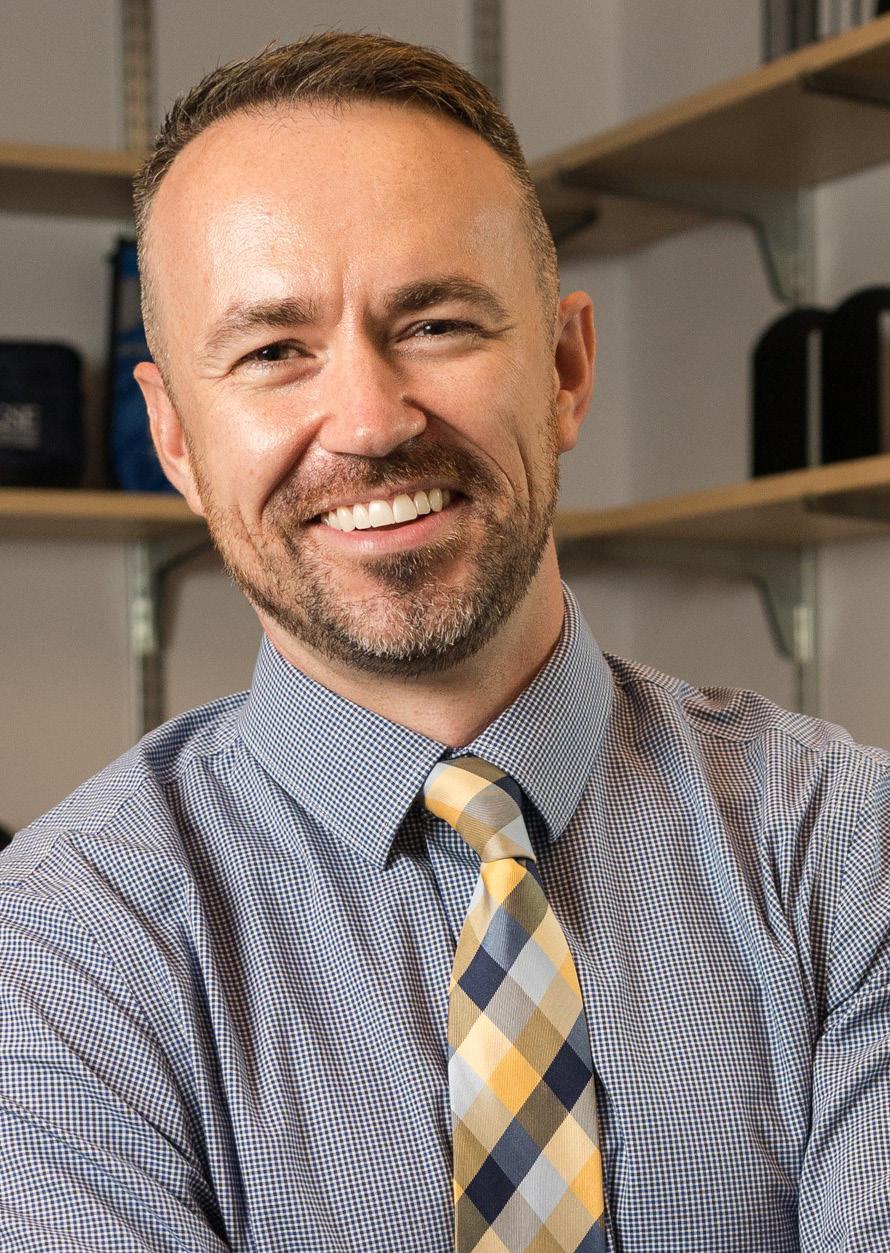

Dr. Annie M. Wofford is an Assistant Professor in the Higher Education program in the Department of Educational Leadership and Policy Studies. Broadly, her research focuses on understanding and disrupting the structural disparities that typify students’ pathways to and through graduate education, with a specific focus on how to create more equitable structures of support (e.g., mentoring networks) in STEM fields.
Dr. Wofford’s current research projects focus on (in)equity within the pathways to and through graduate school in computing-related fields, using critical quantitative and qualitative methods to address related questions in this area. She has received funding from the Inclusive Graduate Education Network to engage in a research-practice partnership about graduate students’ equity-minded mentoring practices and serves as a workshop facilitator for the Equity in Graduate Education consortium.
Her independent and collaborative research has been published in many well-regarded journals, including top-tier higher education outlets (e.g., The Journal of Higher Education, The Review of Higher Education, Higher Education, Research in Higher Education) as well as outlets that cater toward audiences with STEM faculty and practitioners (e.g., Computer Science Education, Journal of Women and Minorities in Science and Engineering). Some of her recent publications include, “Advancing equity in graduate pathways: Examining the factors that sustain and develop computing graduate aspirations,” “(Re)Shaping the socialization of scientific labs: Understanding women’s doctoral experiences in STEM lab rotations,” and “Modeling the pathways to selfconfidence for graduate school in computing.”
Prior to joining the faculty at Florida State University, Dr. Wofford was a Postdoctoral Scholar at Northern Arizona University, where she worked on an NSF-funded project about community college transfer students’ pathways to doctoral programs in computer science. Dr. Wofford earned her Ph.D. in Higher Education and Organizational Change at the University of California, Los Angeles. Prior to pursuing a Ph.D., she previously received a master’s degree in Higher Education Administration at the University of MissouriKansas City, earned a Bachelor of Science in Education degree in Social Studies Education from the University of Central Missouri, and has several years of experience as a scholarpractitioner in medical school graduate admissions.
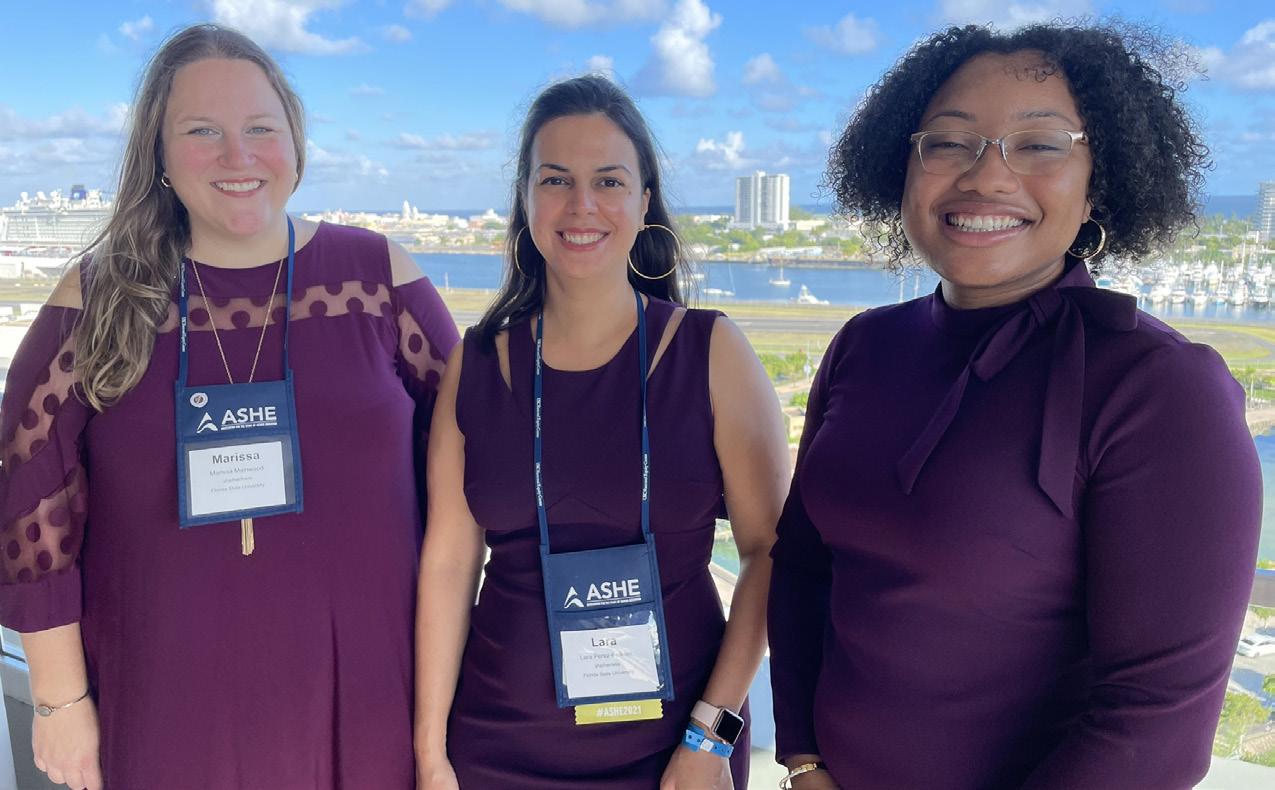

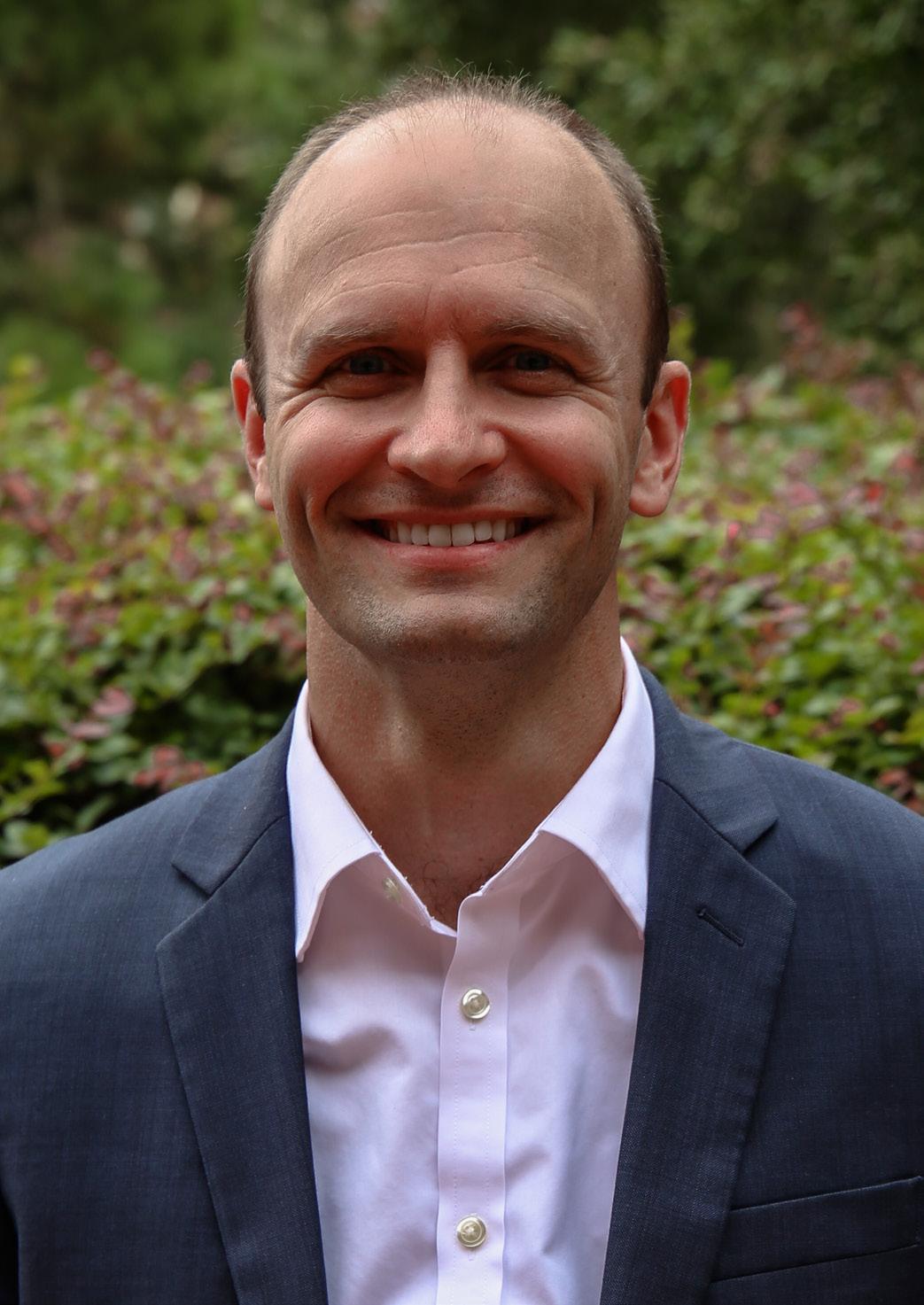
Joe O’Shea is an Associate Professor of Educational Leadership and Policy Studies, as well as FSU’s Associate Provost and Dean of Undergraduate Studies. As Dean, Joe helps lead the university’s award-winning student success initiatives. Joe also serves in expert roles for the Institute of Education Sciences and co-editor of the Journal of Postsecondary Student Success. A Truman and Rhodes Scholar, he has a master’s degree in comparative social policy and a Ph.D. in education from the University of Oxford. Joe is the author of the book Gap Year: How Delaying College Changes People in Ways the World Needs, published by Johns Hopkins University Press, and Doing College Right: A Guide to Student Success, published by Columbia University’s Teachers College Press. He is currently writing a third book, The Education They Deserve: Reimagining the College Learning Experience.
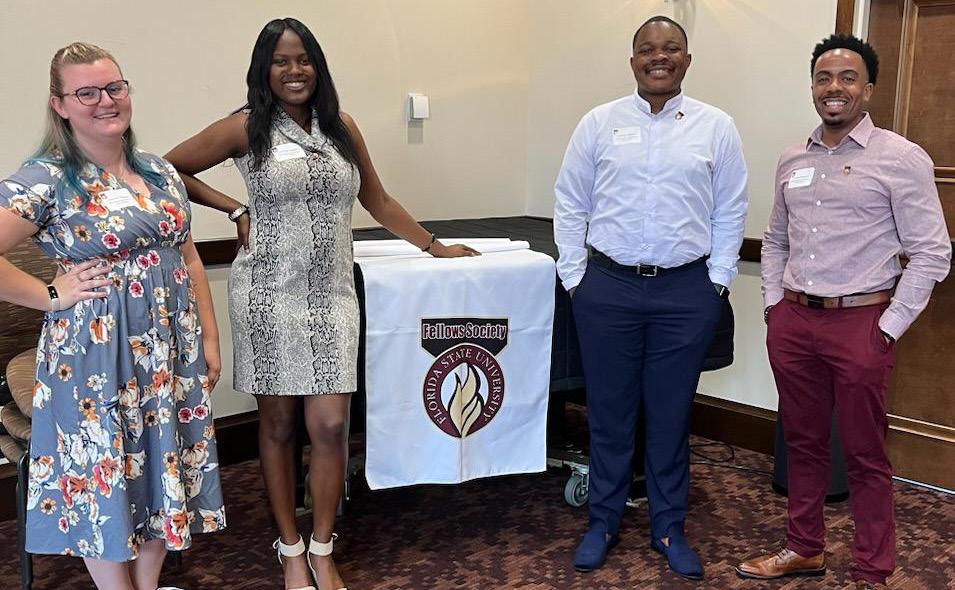
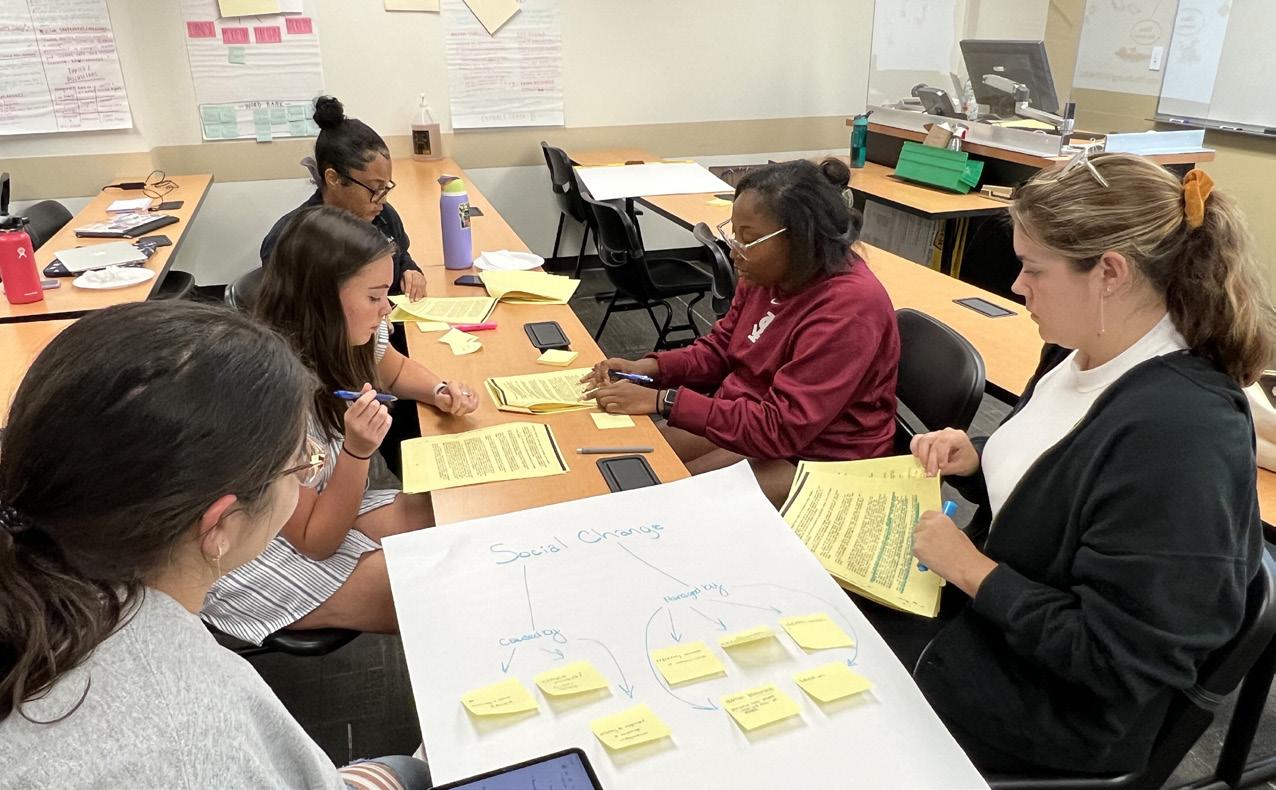
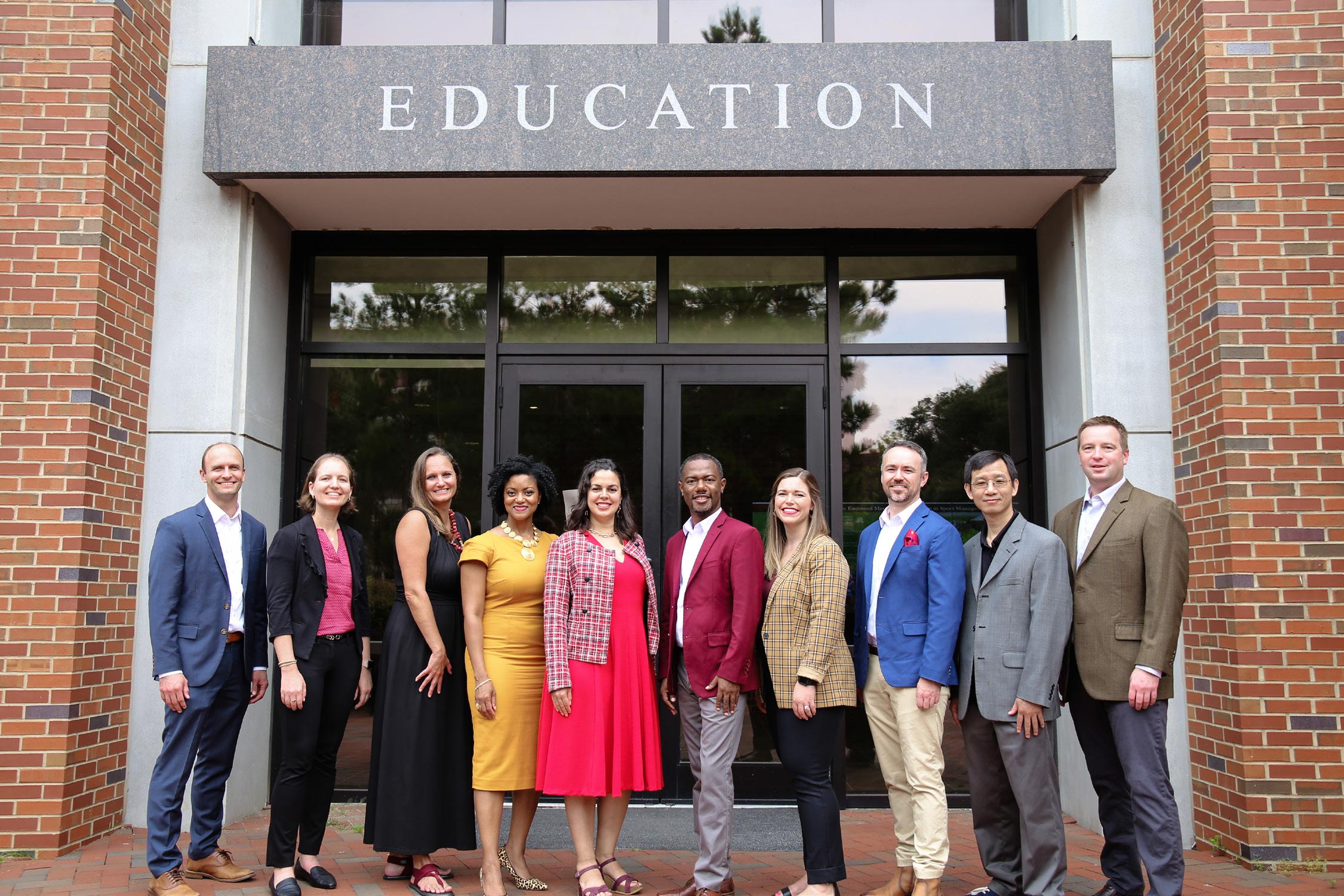
SCHOLARSHIPS, FELLOWSHIPS, GRANTS, & AWARDS
Johnnie Allen Jr., Ph.D. Student McKnight Doctoral Fellowship
• John and Clara McDonald Endowed Scholarship Fund
Ravi Bhatt, Ph.D. Student John and Clara McDonald Fellowship
• 2021-2022 Hardee Center Peer Leadership Award
Josh Burns , M.S. Student
• Alpha Lambda Delta Graduate Fellowship
Makenna Campbell-Hutts, M.S. Student
• NODA Excellence Fund
Norma Cruz, M.S. Student
• Maurice L. Litton Memorial Fund Scholarship Student Employee of the Year Nominee Award
Morgan Danyi, Ph.D. Student
• Division of Student Affairs Innovation Grant, Title IX Dinner & Dialogue Series
Brittany Devies, Ph.D. Candidate
• NASPA New Professional and Graduate Student, NASPA NOW Inquiry Award
• NASPA Region III, Outstanding Graduate Student in Region III Award
• Florida State University, Division of Student Affairs, STAR Award
Ashley Doehling, Ph.D. Student
• Sheila B. Lutz Memorial Scholarship
O’Juan Edwards, Ph.D. Candidate
• McKnight Dissertation Fellowship
Courtney Francis, Ph.D. Candidate Class XVII Florida Gubernatorial Fellowship Recipient (2021-2022)
Gabrielle Haggins, Ph.D. Student
• McKnight Doctoral Fellowship
Holly Henning, Ph.D. Student
• Dr. Linda J. Smith Endowed Scholarship for Lifelong Learning
• Maurice L. Litton Memorial Fund Scholarship
Jabreon Jackson, M.S. Student
• PURPOSE Research Fellow
Jonathan Jackson, Ph.D. Student
• Charles Haworth Awards for Student Veterans in Education
• John W. Daves Veterans Support Scholarship
Cassandra Kepple, Yr Ph.D. Candidate
• FSU Legacy Fellowship (2019-2024)
• Carrie G. Hall Scholarship
Yang Li, Ph.D. Candidate ASHE Graduate Student Travel Scholarship
Derrick Pacheco, Ph.D. Student Myrtis Langston Watts Endowed Scholarship
Da’Shay Portis Templeton, Ph.D. Candidate
• 2022 National Academies of Sciences, Engineering, and Medicine’s Ford Dissertation Fellowship
• 2022 American Education Research Association’s Research Grant
• 2022 American Education Research Association’s Minority Dissertation Fellowship
2022 International Philanthropic Education Organization’s PEO Scholar Award
Gen Ramirez, M.S. Student
• Worthington Fellowship in Student Affairs
Rose Rezaei, Ph.D. Candidate
• Centers for Disease Control and Prevention (CDC) Rape Prevention Education Grant
• U.S. Department of Justice Office on Violence Against Women Grant to Reduce Domestic Violence
Kate Thibodeaux, M.S. Student
• NODA Excellence Fund (NEF) Professional Development Scholarship
Joshlyn Thomas, Ph.D. Candidate
• McKnight Dissertation Fellowship
• Love of Learning Award
• W. Hugh Stickler Grant
Devies, B. (2022). Making the world your classroom: Observation as a pedagogical tool for leadership learning. In K. L. Guthrie, & K. L. Priest (Eds.), Navigating complexities in leadership: Moving towards critical hope (pp. 99-108). Information Age Publishing.
Devies, B. (2022, May). We are the leaders we’ve been waiting for: Women and leadership development in college [Review of the book We are the leaders we’ve been waiting for: Women and leadership development in college, by J. E. Owen]. Journal of College Orientation, Transition, and Retention, 29(1).
Devies, B., & Guthrie, K. L. (2022, March). What mission statements say: Signaling priority of leadership development. Journal of Higher Education Policy and Leadership Studies, 3(1), 91-107. https:// doi.org/10.52547/johepal.3.1.91
Devies, B., Ostermeyer, E., Allbritton, M. R., Pacheco, D. R., Dizor, C. J., Henry, K. J. R., & Clay Jr. A. (2022, June). Reimagining curriculum design: Using focus groups to enhance leadership educator practice. Journal of Higher Education Policy and Leadership Studies, 3(2), 103-120. https://doi.org/10.52547/ johepal.3.2.103
Devies, B., & Owen, J. E. (2022). Cultivating a systems mindset through feminist leadership. In K. L. Guthrie, & K. L. Priest (Eds.), Navigating complexities in leadership: Moving towards critical hope (pp. 175183). Information Age Publishing.
Fluker, C., Perez-Felkner, L., & McCoy, K. (2022). Students’ perceptions of their engineering identity development and REU summer internship program experiences: An equity-centered analysis. ASEE Annual Meeting, Minneapolis, MN. https://peer.asee. org/40969
Ford, J., Matthews, D.Y., & Kepple, C.R. (accepted, not released). Building first-generation student satisfaction for students of color: The role of academic advising. Journal of First-generation Student Success.
Kepple, C.R. (2021). From disability to diversity: College success for students with learning disabilities, ADHD, and autism spectrum disorder: A review. Journal of College Orientation, Transition, and Retention.
Kepple, C.R., Matthews, D.Y, & Washington, J.C. (2021). Making major decisions: Effect of a first-year seminar for exploratory students on major declaration. Journal of College Orientation, Transition, and Retention.
Kepple, C.R. (2022). Power of the people: Higher education and followership in the time of mass media. In K.L. Guthrie & K. Priest, Navigating Complexities in Leadership: Moving Toward Critical Hope. Information Age Publishing.
Pacheco, D.R. (2022). Book Review: Operationalizing culturally relevant leadership learning [Review of the book Operationalizing culturally relevant leadership learning, by C. C. Beatty & K. L. Guthrie]. Journal of Higher Education Leadership and Policy Studies.
Pacheco, D.R. (2022). Understanding the Latinx experience: Developmental and contextual influences [Review of the book Understanding the Latinx experience: Developmental and contextual influences, by V. Torres, E. Hernandez, & S. Martinez]. Journal of College Orientation, Transition, and Retention.
Perez-Felkner, L., Ramirez Surmeier, L., & Rezaei, R. (in press). Gender and educational inequality. In Mark Berends, Barbara Schneider, & Stephen Lamb (Eds.), Handbook on Sociology of Education (31 pages). Sage.
Ruiz-Ezquerro, A. (In press). A call to using roleplaying games and narrative as motivational pedagogy. In Forbes, L. & Thomas, D. (Eds.), The professors at play playbook: Playful teaching techniques in higher education. (1st ed., pp.xx-xx). Carnegie Mellon ETC Press.
Ruiz-Ezquerro, A. (In press). Leadership island: A leadership-learning role-playing game. In Forbes, L. & Thomas, D. (Eds.), The professors at play playbook: Playful teaching techniques in higher education. (1st ed., pp. xx-xx). Carnegie Mellon ETC Press.
Thomas, J. (2022). Examining predictors of bystander intervention to racial microaggressions in college students. American Psychological Association.
Wright II, J. E., Gaozhao, D., Dukes, K., & Templeton, D. S. (2022). The power of protest on policing: Black lives matter protest and civilian evaluation of the police. Public Administration Review, n/a(n/a). https://doi.org/10.1111/puar.13498
Archer Doehling, A., Pacheco, D. R., & Devies, B. (2022, December). Engaging campus student leaders through socially just leadership development. Presented to the biennial meeting of Leadership Educators Institute, New Orleans, LA. (International)
Arias, V., Brown, O. F., & Foreman, E. J., & Devies, B. (2022, March). Social justice and its role in mission statements: Voicing commitments to social justice and implications for student activities professionals. Presented at the annual meeting of the National Association of Student Personnel Administrators (NASPA), Baltimore, MD. (International)
Beatty, C. C., Guthrie, K. L., Devies, B., Edwards, O., Moscaritolo, L., Rana, A., Wiborg, E., & Taylor, L. (2022, March). Leadership educators’ perspectives of operationalizing culturally relevant leadership learning. Presented at the annual meeting of the National Association of Student Personnel Administrators (NASPA), Baltimore, MD. (International)
Bertrand Jones, T., Brewster, B., & Edwards, O.D. (2022). Mentoring: An innate skill for black women senior scholar mentors. Presented at the ASHE 2022 Conference in Las Vegas, Nevada.
Bhatt, R. (2022). Let’s Transform Performativity! Presented to the ACPA-College Student Educators International Annual Conference.
Cox, B.E., Kepple, C.R., & Francis, C.B. (2021). College persistence and graduation for students with Autism related characteristics. Presented at the ASHE 2021 Conference in San Juan, Puerto Rico.
Cox, B.E., Kepple, C.R., & Francis, C.B. (2022). Persistence in STEM majors for students with Autism-related characteristics. Presented at the ASHE 2022 Conference in Las Vegas, Nevada.
Cruz, N. (2022). The world is still your oyster. Presented at the National Academic Advising Association (NACADA) Conference.
Danyi, M. (2022, November 5-7). Building collective knowledge and vocabulary around every day consent [Conference Session]. SACSA Conference, Birmingham, AL, United States.
Devies, B. (2022, March). Making the world your classroom: Observation as a pedagogical tool for leadership learning. Sponsored by the Student Leadership Programs Knowledge Community and presented at the annual meeting of the National Association of Student Personnel Administrators (NASPA), Baltimore, MD. (International)
Devies, B., & Foreman, E. J. (2022, June). Analyzing gender and leadership education through the culturally relevant leadership learning model. Presented at the ILA’s 6th Women and Leadership Conference, Portsmouth, United Kingdom. (International)
Devies, B., Shetty, B., Bitton, A. L., Contreras, L. R., Owen, J. E., & Haber-Curran, P. (2022, December). Narratives on college women’s leadership learning and development. Presented to the biennial meeting of Leadership Educators Institute, New Orleans, LA. (International)
Guthrie, K. L., Priest, K. L., Devies, B., Satterwhite, R., & Mouhamadou, S. N. (2022, December). Navigating complexities in leadership: Moving toward critical hope. Presented to the biennial meeting of Leadership Educators Institute, New Orleans, LA. (International)
Henning, H. & Kepple, C.R. (2022). Is change a good thing? Major salience for previously exploratory students. Presented at the 2022 NACADA Region IV Conference in Atlanta, Georgia.
Kepple, C.R., Cox, B.E., & Francis, C.B. (2022). A national portrait of Autism-specific college support programs in the United States. Presented at the ASHE 2022 Conference in Las Vegas, Nevada.
Kepple, C.R., Epstein-Diaz, H., & Brady, A. (2022). Do these HIPs lie? High impact practices and their connection to post-graduate outcomes. Presented at the SAIR 2022 Conference in New Orleans, Louisiana.
Kepple, C.R., Matthews, D.Y., & Perez-Felkner, L. (2022). Examining the effects of a first-year seminar for exploratory students: A propensity modeling approach. Presented at the 2022 AERA Annual Conference in San Diego, California.
Komives, S. R., Guthrie, K. L, Priest, K. L., Kendall, M., & Devies, B. (2022, December). New directions for student leadership: A conversation with the issue editors. Presented to the biennial meeting of Leadership Educators Institute, New Orleans, LA. (International)
LeBlanc, J. L., Devies, B., & Guthrie, K. L. (2022, March). Fewer silos, better bridges: Community engagement language in institutional mission statements. Presented at the annual meeting of the National Association of Student Personnel Administrators (NASPA), Baltimore, MD. (International)
Li, Y. (2022). Examining Asian International Women’s Perceptions on Gender and Race in STEM Doctoral Programs in US. Presented at the ASHE 2022 Conference.
Nix, S., Emerick, J., Brady, A., & Kepple, C.R. (2022). Work smarter, not harder: Leveraging Power BI to develop FTIC retention and graduation outcome models for campus programs. Presented at the SAIR 2022 Conference in New Orleans, Louisiana.
Pacheco, D.R. (2022). Por la cultura: Latinx leadership in American higher education. Presented to the biennial meeting of Leadership Educators Institute, New Orleans, LA. (International)
Pacheco, D.R., Devies, B., & Guthrie, K.L. (2022). Teaching, research, and service: The role of the Leadership Learning Research Center. Presented to the biennial meeting of Leadership Educators Institute, New Orleans, LA. (International)
Pacheco, D.R., Devies, B., & Doehling, A.A. (2022). Engaging campus student leaders through socially just leadership development. Presented to the biennial meeting of Leadership Educators Institute, New Orleans, LA. (International)

Pacheco, D.R., Vaugh, L., & Robinson, D. (2022). Effective co-teaching in online leadership course. Presented to the biennial meeting of Leadership Educators Institute, New Orleans, LA. (International)
Pacheco, D.R. & Wilson, G. (2022). Identity-based advising: Culturally relevant and compassionate advising. Presented to the ACPA-College Student Educators International Annual Conference.
Ruiz Ezquerro, A. (2022). Frontiers in the space between leadership and role-playing games. Presented at the 2022 International Leadership Association.
Vaughn, L. & Beatty, C.C. (2022, October). Leadership Learning During a Pandemic: Reflections in a Time of Crisis. Presented at the annual International Leadership Association Conference, Washington, D.C.
Vaughn, L., Robinson, D., & Pacheco, D. (2022, October). Effective Co-Teaching in Online Leadership Courses. Roundtable discussion at the annual International Leadership Association Conference, Washington, D.C.
Vaughn, L. & Robinson, D. (2022, October). The Influence of Leadership Educator Positionality on Student Identity and Intersectionality. Roundtable discussion at the annual International Leadership Association Conference, Washington, D.C.
Vaughn, L. & Robinson, D. (2022, June). Effective CoTeaching in Online Leadership Courses. Roundtable discussion at the Association of Leadership Educators Conference, Kansas City, MO.
Vaughn, L. & Robinson, D. (2022, June). The Influence of Leadership Educator Positionality on Student Identity and Intersectionality. Poster presentation at the Association of Leadership Educators Conference, Kansas City, MO.
Ravi Bhatt, Ph.D. Student
• ACPA @ 100 Planning and Logistics Planning Member
Brittany Devies, Ph.D. Candidate
• Co-Host of the NASPA Leadership Podcast
Jabreon Jackson, M.S. Student
• Graduate Associate Program Council Member, NASPA
• New Professional and Graduate Student Review Board Member, Journal of Women and Gender in Higher Education
Yang Li, Ph.D. Candidate
• Chair of CIHE Pre-Conference Session at the 2022 ASHE Conference
Derrick Pacheco, Ph.D. Student Communications Team Lead, NASPA Student Leadership Programs Knowledge Community
• Podcast Producer, NASPA Student Leadership Programs Knowledge Community
Gen Ramirez, M.S. Student
• Co-Founder and Advisor of the Zeta Rho Chapter of Alpha Alpha Alpha (Tri-Alpha) National First Generation Honor Society at FSU
Laura Vaughn, Ph.D. Student
• Roundtable Session Facilitator at the International Leadership Association Conference Directorate Board Member for the ACPA Commission for Global Dimensions of Student Development
• Deputy Speaker of the FSU Congress of Graduate Students
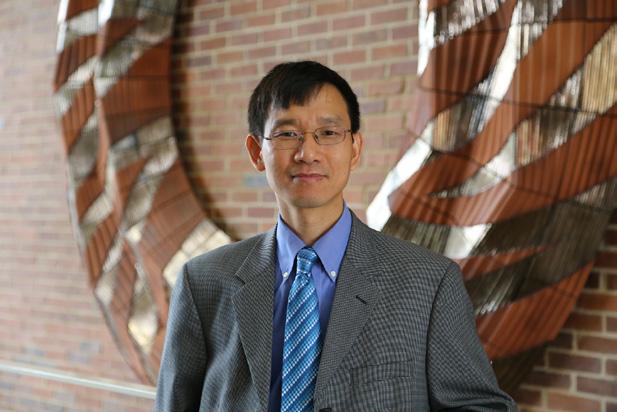
Bertrand Jones, T., Davis-Maye, D., Rahming, S. G., & Andrews, J. (Eds.). (2022). Black Sisterhoods: Paradigms and Praxis. Demeter Press.
Guthrie, K. L., & Priest, K. L. (Eds.). (2022). Navigating Complexities in Leadership: Moving Towards Critical Hope. Information Age Publishing.
Bertrand Jones, T., & Brewster, B. (2021). Presumed Incompetent II: Race, Class, Power, and Resistance of Women in Academia. Teachers College Record.
Bertrand Jones, T., & Wellington, C. (2021). Review of Tell Them We are Rising: The Story of Black Colleges and Universities and Living Thinkers: An Autobiography of Black Women in the Ivory Tower. Films for the Feminist Classroom, 11(1). Retrieved from http://ffc.twu.edu/issue_11-1/rev_BertrandJones-and-Wellington_11-1.html
Doran, E. E., Davis, R. D., Rodriguez Vargas, L., PerezFelkner, L., Smith, M. R., & De Leon Rodriguez, N. (2022). Student success & STEM. In V. A. Sansone & M. Hernandez (Eds.), Working beyond borders to cultivate knowledge and support for Puerto Rican colleges and universities: Post-traditional student characteristics, STEM outcomes, and financial context in Puerto Rico (pp. 22-29). Association for the Study of Higher Education (ASHE). https:// www.ashe.ws//Files/PRCU/report_ASHE2021PuertoRico_FINAL.pdf
Frierson, H. T., Thomas, V. G., & Bertrand Jones, T. (2021). Recognizing of the influences of race in program evaluation and the role of Historically Black Colleges and Universities in producing culturally responsive evaluators. Manuscript submitted for publication, 25 pages.
Gleason, M., Cummings Steele, M., Chung, J., & Guthrie, K. L. (2022). A call for transdisciplinary approaches to address complex challenges, In J. Chung, M. Gleason, K. L. Guthrie, C. D. Navarro, D. E. Pierre, K. L. Priest, M. Cummings Steele, & J. Weng (Eds.), Leadership education through complex transitions (New Directions for Student Leadership, No. 172, p. 79-88). John Wiley & Sons. https://doi. org/10.1002/yd.20472.
Guthrie, K. L., Navarro, C. D., Weng, J., & Priest, K. L. (2022). Interrogating leadership education: Why? For what? For whom? In J. Chung, M. Gleason, K. L. Guthrie, C. D. Navarro, D. E. Pierre, K. L. Priest, M. Cummings Steele, & J. Weng (Eds.), Leadership education through complex transitions (New Directions for Student Leadership, No. 172, p. 45-52). John Wiley & Sons. https://doi.org/10.1002/yd.20468.
Perez-Felkner, L. (2022). Transforming Opportunity to Support STEM Success for All. Policy Brief published with Scholars Strategy Network (SSN) and Student Experience Research Network (SERN).
Priest, K. L., Chung, J., Cummings Steele, M., Gleason, M., Guthrie, K. L., Navarro, C. D., Pierre, D. E, & Weng, J. (2022). Co-inquiry during unprecedented times. In J. Chung, M. Gleason, K. L. Guthrie, C. D. Navarro, D. E. Pierre, K. L. Priest, M. Cummings Steele, & J. Weng (Eds.), Leadership education through complex transitions (New Directions for Student Leadership, No. 172, p. 19-28). John Wiley & Sons. https://doi.org/10.1002/yd.20465.
Cox, B. E., Brogdon, B., Roy, A., & Edelstein, J. (2021). Navigating challenges to facilitate success for college students with autism. 92(2), 252-278. Journal of Higher Education. https://doi.org/10.1080/002215 46.2020.1798203
Devies, B., & Guthrie, K. L. (2022). What mission statements say: Signaling the priority of leadership development. Journal of Higher Education Policy and Leadership Studies, 3(1), 91 -107. https://dx.doi. org/10.52547/johepal.3.1.91.
Dougherty, Shaun M.; Ecton, W. G. Bonilla, S., McGuinness, Sophie (2022). The effects of the COVID-19 pandemic and recession on career preparation during high school. Peabody Journal of Education, 97(3), 326-343. https://doi.org/10.1080/01 61956X.2022.2079911.
Ecton, W. G.; Bennett, C., Nienhusser, H. K. CastilloMontoya, M. Dougherty, S. M. (2021). If you fund them, will they come? Implications from a PhD fellowship program on racial/ethnic student diversity. AERA Open, 7. https://doi.org/10.1177/2332 8584211040485.
Acosta, A. A., & Guthrie, K. L. (2021). Defining a leader: The leadership identity development of Latino men. Journal of Leadership Education, 20(4), 1-18. https://doi.org/10.12806/V20/I4/R1.
Acosta, A. A., & Guthrie, K. L. (2022). Haciendose un Líder: Leadership identity development of Latino men at a Predominantly White Institution. Journal of Hispanic Higher Education, 21(1), 112-125. https://doi. org/10.1177/1538192720932472.
Ansel, D.; Dougherty, S. M.; Ecton, W. G., Holden, K.; Theobald, R. (2022). Student interest and equitable access to career and technical education high schools of choice. Journal of School Choice. https:// doi.org/10.1080/15582159.2022.2039427.
Atwell, A., Miller, S., Ecton, W. G., Sublett, C. D’Amico, M. (2022). Navigating changes in economic and policy environments: Community colleges aligning workforce education with local labor markets. New Directions for Community Colleges Advocacy for Change, 197, 45-58. https://doi.org/10.1002/ cc.20496.
Beatty, C. C. & Lima, A. (2022) Normalcy, avoidance, consciousness raising: Exploring how student leaders navigate racial battle fatigue. Journal of Student Affairs Research and Practice, 59(4), 371384, https://doi.org/10.1080/19496591.2021.1955697
Beatty, C. C., & Manning-Ouellette, A. (2022). Building identity, capacity, and efficacy: Exploring leadership learning through short-term study abroad experiences. Journal of Leadership Education, 21(1), 15. doi:10.12806/V21/I1/R12
Blaney, J. M., Wofford, A. M., Jeong, S., Kang, J., & Feldon, D. F. (2022). Autonomy and privilege in doctoral education: An analysis of STEM students’ academic and professional trajectories. The Journal of Higher Education, 93(7), 1037-1063. https://doi.org /10.1080/00221546.2022.2082761
Ecton, W. G. & Dziesinski, A. (2021). Using punctuated equilibrium to understand patterns of institutional budget change in higher education. The Journal of Higher Education, 93(3), 424-451. https://doi.org/10.1 080/00221546.2021.1985884.
Ecton, W. G. & Dougherty, S. M. (2022). Heterogeneity in high school career and technical education outcomes. Educational Evaluation and Policy Analysis (EEPA). https://doi. org/10.3102/01623737221103842.
Fluker, C., Perez-Felkner, L., & McCoy, K. (2022). Students’ perceptions of their engineering identity development and REU summer internship program experiences: An equity-centered analysis. ASEE Annual Meeting, Minneapolis, MN. https://peer.asee. org/40969
George, K. L., Sax, L. J., Wofford, A. M., & Sundar, S. (2022). The tech trajectory: Examining the role of college environments in shaping students’ interest in computing careers. Research in Higher Education, 63(5), 871-898. https://doi.org/10.1007/s11162-02109671-7
Guthrie, K. L., Chunoo, V. S., & Peters, A. B. (2021). Discovering values and sense of purpose through leadership education. Journal of Leadership Accountability and Ethics, 18(6), 1-12. https://doi. org/10.33423/jlae.v18i6.
Guthrie, K. L., Chunoo, V. S., & Teig, T. (2021). Leadership education: Teaching resilience forfuture success. Journal of Higher Education Policy and Leadership Studies, 2(3), 58-75. https://doi. org/10.52547/johepal.2.3.58.
Guthrie, K. L., Hu, P., Batchelder, J. M., & Purita, R. (2022). Online academic leadership programs in the United States: An overview. Journal of Leadership Education, 21(2), 18-31. https://doi.org/10.12806/V21/ I2/R2.
Guthrie, K. L., & Torres, M. (2021). Latinx leadership learning: Lessons from an undergraduate academic course. Journal of Leadership Education, 20(3), 23-32. https://doi.org/10.12806/V20/I3/A4.
Mokher, C. G., & Hu, S. (2022). Diverging paths: Exploring the association between initial math pathways and college students’ subsequent math performance. Journal of Postsecondary Student Success, 1(3), 50-74. https://doi.org/10.33009/ fsop_jpss129846
Mokher, C. G., & Jacobson, L. (2021). A partnership model approach to understanding challenges in collaboration around college readiness. Educational Policy, 35(3), 450-480. https://doi. org/10.1177/0895904818823742
Mokher, C. G., & Jacobson, L. (2021). Beyond academic preparation: The role of high schools in shaping postsecondary plans for underprepared students. Leadership and Policy in Schools, 1-21. https://doi.org/10.1080/15700763.2021.1885719
Mokher, C. G., Park-Gaghan, T. J., & Hu, S. (2021). Does the method of acceleration matter? Exploring the likelihood of college coursetaking success across four developmental education instructional strategies. Teachers College Record, 123(9), 3-27
Mokher, C. G., Park-Gaghan, T. J., & Hu, S. (2021). Does developmental education reform help or hinder the success of language minority students? An exploration by language minority, ESOL, and foreign-born status. Education Finance and Policy, 1-57. https://doi.org/10.1162/edfp_a_00364
Mokher, C. G., Park-Gaghan, T. J., & Hu, S. (2021). Shining the spotlight on those outside Florida’s reform limelight: The impact of developmental education reform for non-exempt students. Journal of Higher Education, 92(1), 84-115. https://doi.org/10.1 080/00221546.2020.1782308
Mokher, C. G., Park-Gaghan, T. J., & Hu, S. (2021). What happens to efficiency and equity? The cost implications of developmental education reform. Research in Higher Education, 62, 151–174. Retrieved from https://rdcu.be/ce8KV https://doi.org/10.1007/ s11162-020-09593-w
Nachman, B. R., McDermott, C. T., & Cox, B. E. (2022). Autism-specific college support programs: Differences across geography and institutional type. Journal of Autism and Developmental Disorders. https://doi.org/10.1007/s10803-021-04958-1
Nix, A. N., Bertrand Jones, T., & Hu, S. (2021). Advising academically underprepared students in the college for all era. Review of Higher Education, 45(2), 211-238. doi:10.1177/0091552121
Nix, A. N., Bertrand Jones, T., & Hu, S. (2021). The perceptions and experiences of faculty implementing Florida’s developmental education reform. Educational Policy, 1-27. doi:10.1177/08959048211058438
Nix, A. N., Daniels, H., Hu, P., Bertrand Jones, T., & Hu, S. (2021). “There’s so much that we’re doing”: How Florida’s State Colleges support their students. Community College Review. doi:10.1177/0091552121
Stevens, D., Chetty, R., Bertrand Jones, T., Yallew, A., & Butler-Henderson, K. (2021). Doctoral supervision and COVID-19: Autoethnographies from four faculty across three continents. Journal of University Teaching & Learning Practice, 18(5), 1-19. https://doi. org/10.14453/jutlp.v18i5.6
Park-Gaghan, T. J., Mokher, C. G., Spencer, H., & Hu, S. (2021). Do rising tides lift all boats? Exploring heterogeneous treatment effects of Florida’s developmental education reform by high school academic preparation. American Journal of Education, 127(3), 471-495. https://doi. org/10.1086/714244
Pierre, D., Beatty, C. C., & Duran, A. (2021). No place like home: The coming out experiences of gay men in student affairs and higher education preparation programs. Georgia Journal of College Student Affairs, 37(2), 19. Retrieved from https://digitalcommons. georgiasouthern.edu/gcpa/vol37/iss2/6
Perez-Felkner, L. (2021). Affirmative action challenges keep on keeping on: Responding to shifting federal and state policy. Perspectives: Policy and Practice in Higher Education, 25(1), 19-23. https://doi.org/10.108 0/13603108.2018.1529639
Perez-Felkner, L., Gast, M. J., & Ovink, S. M. (2022). Liberating our writing: Critical narratives and systemic changes in education and the social sciences. Multicultural Perspectives, 24(3).
Suárez, E., & Beatty, C. C. (2022). Advising in science education: Critiquing where we have been, moving toward an equitable and holistic advising approach. Science Education, online first. https://doi. org/10.1002/sce.21745
Wofford, A. M. (2022). The perpetuation of privilege: Exploring the relationship between early admissions and high-impact practices. Research in Higher Education. Advance online publication. https://doi. org/10.1007/s11162-022-09681-z
Wofford, A. M., & Gutzwa, J. A. (2022). Funds of science identity: Toward an asset-based framework for undergraduate STEM research and praxis. Journal of Women and Minorities in Science and Engineering, 28(3), 59-81. http://doi.org/10.1615/ JWomenMinorScienEng.2022036454
Wofford, A. M., Sax, L. J., George, K. L., Ramirez, D., & Nhien, C. (2022). Advancing equity in graduate pathways: Examining the factors that sustain and develop computing graduate aspirations. The Journal of Higher Education, 93(1), 110-136. https://doi.org/10 .1080/00221546.2021.1930840
Wofford, A. M., & Smith, K. N. (2022). Analyzing signals of (in)equity and power in engineering college internship advertisements. Journal of Women and Minorities in Science and Engineering, 28(4), 25-49. https://doi.org/10.1615/ JWomenMinorScienEng.2021037923
Wofford, A. M., & Winkler, C. E. (2022). Publication patterns of higher education research using quantitative criticalism and QuantCrit perspectives. Advance online publication. Innovative Higher Education. https://doi.org/10.1007/s10755-02209628-3
Zhao, K., Park-Gaghan, T. J., Mokher, C. G., & Hu, S. (2022). Examining the impacts of Florida’s developmental education reform for non-exempt students: The case of first-year English and math course enrollment and success. Community College Review. https://doi.org/10.1177/00915521211061417
Zhao, T., & Perez-Felkner, L. (2022). Perceived abilities or academic interests? Longitudinal high school science and mathematics effects on postsecondary STEM outcomes by gender and race. International Journal of STEM Education, 9(1), 1-26. https://doi.org/10.1186/s40594-022-00356-w
• Perez-Felkner, Lara Cristina (PI). (Aug 2021–Aug 2022). Making Hunger Visible: Florida ResearchPractitioner Partnership on Food Insecurity. Funded by American Educational Research.
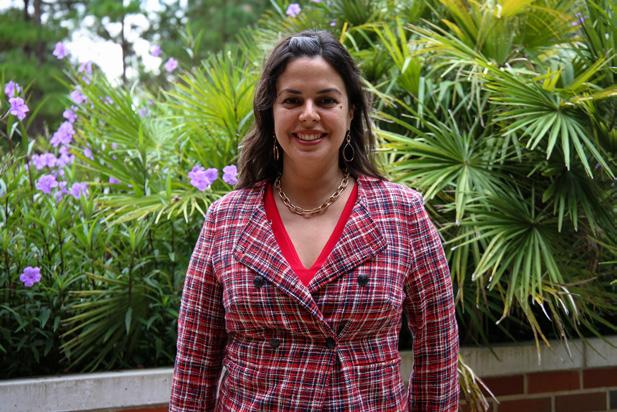
Reid Marks, L., Jenkins, L., & Perez-Felkner, L. (2021–2022). Applying Bystander Interventions to Racial Microaggressions in a College Student Population. Funded by FSU Office of Research, Collaborative Collision Mini-Grant Competition on Anti-Racism, Equity, and Inclusion.
• Perez-Felkner, Lara Cristina (Co-PI), Root, Jenny Rose (Co-PI), & Patton-Terry, Nicole S (PI). (Jul 2022–Jun 2025). University Research Partnerships to Reduce Educational Disparity in College Towns: Building a Model Framework in Tallahassee, Florida. Funded by Doris Duke Charitable Foundation. (2022043). Total award $650,000.
• Park-Gaghan, T. J., & Mokher, C. G. (Aug 2021–Jul 2025). Exploring co-requisite developmental education models. Funded by Institute of Education Sciences, U.S. Department of Education. (R305A210319). Total award $1,549,630.
• Postsecondary Education: Autistic College Students’ Experiences of Success (PEACES; Phase 1). Funded by...
• Frist Center for Autism and Innovation, Vanderbilt University ($27,500) (2022)
• FAR Fund ($90,000) (2022-2024)
•
Cameron C. Beatty
• ACPA Coalition and Networks Advocate Award, ACPA- College Student Educators International (2022).
• Dr. Susan R. Komives Research Award, NASPA’s Student Leadership Programs Knowledge Community (2022).
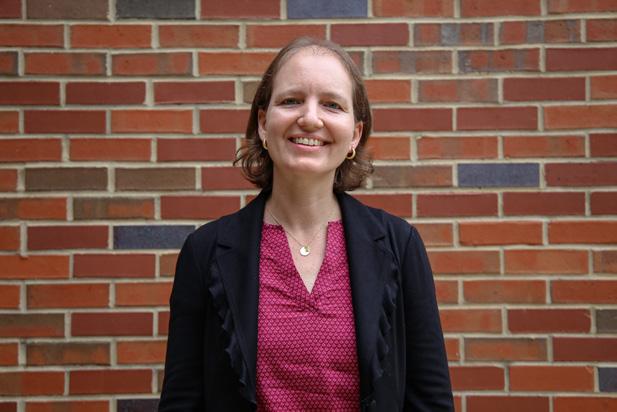
• Elizabeth A. Greenleaf Distinguished Alumni Award, Indiana University, Higher Education & Student Affairs Program (2021).
• Mid-Career Fellow, Student Experience Research Network (SERN) (2021-22)
• Mid-Career Fellow, FSU-FAMU’s Institutional Challenge Grant, W.T. Grant Foundation (2022-25) NSF Quantitative Critical Methodologies Scholar, Institute in Critical Quantitative, Computational, & Mixed Methodologies (ICQCM) (2021-23)
• ASHE/Ascendium Fellow (2021)
• Finalist, Robert M. Gagne Research Award, College of Education, Florida State University (2021, 2022)
• Graduate Teaching Award, College of Education, Florida State University (2021)
• Inclusive Graduate Teaching and Advising Award, Office of the Provost, Florida State University (2022) Distinguished Service as Program Co-Chair for the 2022 ASHE National Conference
• Finalist, Robert M. Gagne Research Award, College of Education, Florida State University (2021)
